Or try one of the following: 詹姆斯.com, adult swim, Afterdawn, Ajaxian, Andy Budd, Ask a Ninja, AtomEnabled.org, BBC News, BBC Arabic, BBC China, BBC Russia, Brent Simmons, Channel Frederator, CNN, Digg, Diggnation, Flickr, Google News, Google Video, Harvard Law, Hebrew Language, InfoWorld, iTunes, Japanese Language, Korean Language, mir.aculo.us, Movie Trailers, Newspond, Nick Bradbury, OK/Cancel, OS News, Phil Ringnalda, Photoshop Videocast, reddit, Romanian Language, Russian Language, Ryan Parman, Traditional Chinese Language, Technorati, Tim Bray, TUAW, TVgasm, UNEASYsilence, Web 2.0 Show, Windows Vista Blog, XKCD, Yahoo! News, You Tube, Zeldman
Firdosh Khan
Higher Education Marketing & PREducation Marketing in 2024: Meaning, Significance, and Benefits 29 Feb 2024, 2:13 pm
Education marketing encompasses the strategic promotion of educational institutions, programs, products, or services to a diverse audience, ranging from prospective students and parents to educators and businesses seeking workforce development.

The strategic implementation of Education Marketing stands as an indispensable pillar, shaping the narrative of institutions, programs, and services. As we dig into 2024, the landscape has evolved significantly, propelled by the ever-increasing competition among educational entities.
Education Marketing, in essence, involves the adept promotion of educational offerings to a diverse audience, ranging from prospective students to discerning parents and businesses seeking skillful workforce development.
Latest data from the Education Marketing industry underscores the crucial role of strategic marketing initiatives. A report by ComboApp in 2023 revealed a substantial surge, with 78% of higher education institutions augmenting their online marketing budgets.
This significant shift underscores the sector’s recognition of the digital sphere’s paramount importance in reaching and engaging the contemporary audience.

In an era marked by an abundance of educational choices, effective marketing has become synonymous with survival and success. It extends beyond merely attracting students, encompassing the nuanced art of highlighting unique value propositions, fostering trust through testimonials, and building brand credibility.
The competitive edge lies in not only expanding enrollment figures but in curating a distinct identity that resonates in an increasingly crowded educational landscape.
What is Education Marketing?
Education marketing encompasses the strategic promotion of educational institutions, programs, products, or services to a diverse audience, ranging from prospective students and parents to educators and businesses seeking workforce development.

In the competitive landscape of 2024, effective marketing has become paramount for educational institutions to stay relevant and thrive.
The significance of education marketing lies in its multifaceted role. Firstly, it enables institutions to reach a broader audience beyond traditional word-of-mouth channels, utilizing various digital platforms.
Secondly, it aids in highlighting unique value propositions, allowing institutions to differentiate themselves in a crowded market. Thirdly, education marketing is instrumental in building trust and credibility through strategic communication, testimonials, and data-driven information.
The benefits of a well-executed education marketing strategy are extensive. It not only results in increased enrollment figures but also enhances brand awareness, improves student engagement through compelling content, and fosters stronger relations with alumni.
Significance of Education Marketing
As we step into 2024, the landscape of higher education is more competitive than ever, necessitating a strategic approach to outreach and engagement. Education Marketing, a critical facet of institutional success, involves the promotion of educational institutions, programs, products, or services to diverse stakeholders.

The significance of education marketing in the current environment cannot be overstated, and its relevance is underscored by compelling data from recent industry reports.
Reaching a wider audience is paramount in an era where traditional word-of-mouth recruitment strategies fall short. According to a 2023 report by ComboApp, 78% of higher education institutions have significantly increased their online marketing budgets.
This emphasizes a notable shift towards digital marketing strategies, reflecting the industry’s recognition of the need to extend reach beyond conventional boundaries. Highlighting unique value propositions is a strategic imperative. With myriad educational options available, institutions must stand out.
Data from the HubSpot Blog in 2022 reveals that 73% of students prioritize clear information about campus life and support services when selecting an institution.

Effective marketing allows institutions to articulate their strengths, specific programs, and differentiators, ranging from faculty expertise to cutting-edge facilities.
Building trust and credibility are foundational to an institution’s success. Strategic marketing, incorporating testimonials, success stories, and data-driven information, plays a pivotal role.
By doing so, institutions can establish themselves as trustworthy and credible options, providing the assurance that students and stakeholders seek in an increasingly competitive educational landscape.
Benefits of Effective Education Marketing
Effective education marketing stands as a linchpin for institutional success, offering a myriad of benefits that directly contribute to long-term sustainability and growth. Recent data gleaned from reputable reports sheds light on the tangible advantages institutions reap from astute marketing strategies.
![Higher Education Marketing 2023 and Beyond [Detailed Analysis], Higher Education Marketing, Education Marketing, Education PR, Digital PR, Public Relations, Digital Marketing, social media, SEO for Higher Education, Digital Marketing for Higher Education](https://firdoshkhan.in/wp-content/uploads/2022/11/Higher-Education-Marketing.jpg)
Increased enrollment, a pivotal metric for any educational institution, is a direct outcome of effective marketing. Well-crafted marketing campaigns lead to a surge in applications, ultimately bolstering enrollment figures.
A study conducted by ed.marketing found that institutions with a strong brand presence experience a notable 20% increase in applications compared to their counterparts lacking such a robust presence.
The enhancement of brand awareness is a multifaceted advantage that reverberates across the educational landscape. Consistent and strategic marketing efforts not only position institutions as leaders in their fields but also carve out a distinct identity.
This is pivotal in attracting new students, fostering partnerships, and solidifying the institution’s reputation. A 2023 report by Marketing Sherpa indicates that email marketing, when executed effectively, generates the highest return on investment (ROI) for educational institutions, with an average return of $42 for every $1 spent.
![Higher Education Marketing 2023 and Beyond [Detailed Analysis], Higher Education Marketing, Education Marketing, Education PR, Digital PR, Public Relations, Digital Marketing, social media, SEO for Higher Education, Digital Marketing for Higher Education](https://firdoshkhan.in/wp-content/uploads/2022/11/Higher-Education-Marketing-Strategies.jpg)
Improved student engagement, a critical factor for academic success and overall satisfaction, is another key benefit. By leveraging modern marketing techniques such as social media engagement, interactive content, and live Q&A sessions, institutions can foster a stronger connection with their student body, enhancing the overall educational experience.
Stronger alumni relations, a testament to an institution’s enduring impact, are nurtured through well-crafted marketing efforts. Effective storytelling and targeted campaigns can maintain a meaningful connection with former students, leading to a sense of community. This, in turn, can pave the way for potential alumni donations and support, further contributing to the institution’s long-term financial health.
Latest Trends and Examples in Education Marketing
One of the predominant trends shaping education marketing is the significant rise of online marketing. According to a 2023 report by ComboApp, a notable 78% of higher education institutions have escalated their online marketing budgets.
![Higher Education Marketing 2023 and Beyond [Detailed Analysis], Higher Education Marketing, Education Marketing, Education PR, Digital PR, Public Relations, Digital Marketing, social media, SEO for Higher Education, Digital Marketing for Higher Education](https://firdoshkhan.in/wp-content/uploads/2022/11/Higher-ED-Marketing-Content.jpg)
This shift underscores the industry’s recognition of the growing prominence of digital platforms, necessitating a strategic allocation of resources to effectively leverage the online space.
A pivotal focus on student experience has emerged as a cornerstone of modern education marketing strategies. A 2022 study by HubSpot Blog delves into the preferences of prospective students, revealing that 73% prioritize clear information about campus life and support services when selecting an institution.
This insight underscores the importance of marketing efforts that go beyond program offerings, emphasizing the creation of a holistic and positive student experience.
The advent of personalization and targeted marketing strategies is reshaping how institutions engage with their audience. Leveraging data and analytics to tailor marketing messages to specific audience segments is gaining prominence.

This approach allows institutions to resonate more effectively with their target demographics, addressing individual needs and preferences. The growing emphasis on personalization aligns with the broader trends observed in various industries as consumers increasingly seek customized experiences.
To illustrate these trends in action, examining successful education marketing campaigns provides valuable insights. The University of Pennsylvania’s “Think Big” campaign exemplifies a multi-channel approach that utilizes inspiring stories and visuals to showcase the institution’s commitment to innovation and social impact.
Another noteworthy example is Khan Academy’s use of free educational videos, showcasing the power of content marketing in education. Duolingo’s gamified language learning app stands as an exemplar of effective marketing by making language learning engaging and accessible, drawing a large user base.
Emerging Technologies and Challenges in Education Marketing
The intersection of emerging technologies and the associated challenges presents both opportunities and considerations for institutions striving to stay at the forefront of innovation.

The integration of Artificial Intelligence (AI), Augmented Reality (AR), Virtual Reality (VR), and Data Analytics has become a focal point, reshaping how institutions engage with their audience.
Artificial Intelligence, particularly in the form of AI-powered chatbots, stands out as a transformative tool in education marketing. These intelligent systems can personalize student inquiries, automate repetitive tasks, and provide 24/7 support, enhancing accessibility and user experience.
Moreover, AI enables the personalization of marketing campaigns based on individual student interests and demographics, aligning communication strategies with the unique needs of each prospective student.
![Higher Education Marketing 2023 and Beyond [Detailed Analysis], Higher Education Marketing, Education Marketing, Education PR, Digital PR, Public Relations, Digital Marketing, social media, SEO for Higher Education, Digital Marketing for Higher Education](https://firdoshkhan.in/wp-content/uploads/2022/11/Online-Program-Higher-Education-Markrting-.jpg)
Augmented Reality (AR) and Virtual Reality (VR) are revolutionizing the way institutions showcase their offerings. AR apps create interactive virtual tours, allowing prospective students to explore campuses, classrooms, and labs in an immersive manner.
VR takes this a step further by providing experiences that immerse students in potential learning environments, offering a glimpse into facilities, programs, and even simulations of real-world scenarios. These technologies not only enhance the visual appeal of marketing materials but also provide a unique and engaging way for students to experience an institution before making a commitment.
Data Analytics is another significant facet of the evolving education marketing landscape. By harnessing the power of student data, institutions can gain valuable insights into behaviors and preferences, enabling them to tailor marketing messages effectively. Analyzing data allows institutions to refine strategies, personalize communication, and optimize the overall student experience.
![Higher Education Marketing 2023 and Beyond [Detailed Analysis], Higher Education Marketing, Education Marketing, Education PR, Digital PR, Public Relations, Digital Marketing, social media, SEO for Higher Education, Digital Marketing for Higher Education](https://firdoshkhan.in/wp-content/uploads/2022/11/Facebook-Ads-Metrics.jpg)
However, with the adoption of these cutting-edge technologies comes a set of challenges that must be navigated responsibly. Accessibility stands out as a critical consideration, as ensuring that everyone, regardless of their technological resources, has access to educational opportunities is vital to avoid exacerbating existing disparities.
Data privacy remains paramount, demanding robust measures to protect student information and secure informed consent for its utilization. The specter of algorithmic bias looms, emphasizing the need for careful development and continuous monitoring to prevent unintended discrimination in AI-powered systems.
![Higher Education Marketing 2023 and Beyond [Detailed Analysis], Higher Education Marketing, Education Marketing, Education PR, Digital PR, Public Relations, Digital Marketing, social media, SEO for Higher Education, Digital Marketing for Higher Education](https://firdoshkhan.in/wp-content/uploads/2022/11/Google-Ads-Advertising.jpg)
As we look forward, the education marketing landscape is poised for further evolution. The integration of the metaverse and immersive experiences could usher in virtual campuses and interactive learning environments.
Personalization using AI and machine learning is anticipated to deepen, offering tailored marketing messages, learning recommendations, and support services for each student. A heightened focus on lifelong learning aligns with the growing demand for continuous upskilling programs.
Conclusion
Education marketing’s significance is underscored by its pivotal role in attracting students and maintaining a competitive edge. The shift towards online marketing, as evidenced by a substantial increase in budgets reported by 78% of higher education institutions, reflects the industry’s adaptability to evolving trends.

Moreover, the emphasis on student experience, gleaned from a 2022 study, elucidates the pivotal role clear information about campus life plays in shaping prospective students’ decisions.
As institutions navigate this transformative period, the importance of ethical considerations cannot be overstated. Striking a balance between leveraging emerging technologies such as AI, AR, and VR while ensuring accessibility, data privacy, and fairness is crucial.
The future of education marketing lies in the metaverse, AI personalization, and a continued focus on lifelong learning.
In essence, education marketing remains a linchpin for institutions aiming to thrive in an ever-evolving landscape. By embracing innovation responsibly, institutions can forge a path toward sustained success, ensuring their marketing strategies align with the evolving needs and preferences of the student demographic.
The post Education Marketing in 2024: Meaning, Significance, and Benefits appeared first on Firdosh Khan.
Unleashing the Power of AI in PPC Campaigns for Higher Education Institutions 17 Jan 2024, 1:44 am
Let’s be real, organic search is like simmering a slow pot of leads – it takes time. But PPC? It’s a pressure cooker, delivering 50% more leads than organic, according to Hubspot.
![Higher Education Marketing 2023 and Beyond [Detailed Analysis], Higher Education Marketing, Education Marketing, Education PR, Digital PR, Public Relations, Digital Marketing, social media, SEO for Higher Education, Digital Marketing for Higher Education](https://firdoshkhan.in/wp-content/uploads/2022/11/Facebook-Ads-Metrics.jpg)
Imagine this: A prospective student, scrolling through their Instagram feed, stops. Not at a funny meme, but at an ad, eerily specific.
It talks about their passion for astrophysics, mentions the professor researching black holes they recently admired, and even highlights the financial aid options they were curious about.
Intrigued, they click, leaving behind a trail of digital breadcrumbs for the university, who can nurture this budding interest with personalized emails, virtual tours, and targeted scholarships.

This is not a scene from a sci-fi movie, but the potential of AI-powered Pay-Per-Click (PPC) campaigns in today’s education landscape. In a world overflowing with information and competing institutions, reaching the right students, at the right moment, with the right message has become the golden ticket for enrollment success.
Traditional search campaigns simply can’t offer the precision and dynamism needed to navigate the ever-evolving online marketing battlefield.
Why PPC? The Data Speaks of Enrollment Gold:
Let’s be real, organic search is like simmering a slow pot of leads – it takes time. But PPC? It’s a pressure cooker, delivering 50% more leads than organic, according to Hubspot.

And the ROI? A sizzling 200%, as Search Engine Journal proclaims. In the competitive education market, where every enrolled student is a precious ingredient, these numbers are more than just statistics; they’re a recipe for success.
But PPC transcends mere conversions. It’s about crafting personalized narratives, nurturing leads with care, and ultimately, influencing a student’s decision like a master chef shaping the perfect dish.
Traditional search campaigns, with their broad-brush approach, are like bland recipes for the masses. They lack the finesse to truly touch the hearts and minds of your ideal students.
Leveraging AI for Precision Targeting
In the dynamic realm of higher education marketing, precision targeting stands as the linchpin for success, and the integration of Artificial Intelligence (AI) is reshaping this landscape. According to recent reports from prominent industry sources, AI’s impact on audience insights is monumental.

Advanced algorithms adeptly analyze vast datasets, including user behavior and demographics, allowing institutions to target prospective students with unprecedented accuracy. This precision not only ensures efficient resource allocation but also increases the likelihood of conversion.
Hyperlocal contextual targeting, as reported by studies in the Education Marketing Industry, takes targeting to a new level. AI’s capability to analyze the context of search queries and website content enables institutions to place ads alongside articles relevant to specific scholarship opportunities or academic programs actively researched by students. This refined approach maximizes ad relevance, elevating the overall campaign effectiveness.
Moreover, dynamic remarketing strategies, amplified by AI, offer a personalized touchpoint throughout a student’s decision journey.
By dynamically displaying ads based on a student’s previous interactions with the institution’s website or content, AI keeps the institution at the forefront of the student’s mind.

Reports from the HigherEd Marketing Report indicate a significant increase in engagement and conversion rates through these personalized strategies.
As institutions delve into the realm of AI-powered precision targeting, the evidence suggests a paradigm shift in the efficacy of higher education marketing campaigns.
The amalgamation of AI and precision targeting not only optimizes resource allocation but also enhances the overall quality and relevance of interactions with prospective students, presenting an unparalleled opportunity for institutions to thrive in an increasingly competitive landscape.
Enter AI: The Smart Net in the Digital Ocean
AI-powered PPC platforms bring a level of sophistication that traditional methods simply cannot match. Here’s how they unlock a new universe of opportunities for education marketers:

- Hyper-Targeted Audiences: Imagine identifying potential students based on their online behavior, interests, and academic aspirations, with granular precision. AI algorithms can analyze vast amounts of data to build detailed profiles, allowing you to target ads to the students most likely to resonate with your programs. It’s like casting a customized lure, irresistible to a specific type of fish.
- Dynamic Ad Personalization: No more generic “apply now” button ads. AI can tailor ad copy and creatives in real-time, showcasing relevant programs, scholarships, and faculty expertise based on the individual user. Think of it as having a personal admissions counselor whispering in each student’s ear while they scroll through their phone.
- Real-Time Bidding Optimization: Bidding in an online auction can be like a high-stakes game of poker. AI, however, can analyze complex data patterns and predict with uncanny accuracy which bids will yield the most qualified leads and conversions. It’s like having a super-powered AI dealer stacking the deck in your favor.
- Automated Optimization: Gone are the days of manual campaign tweaks and late-night data crunching. AI can continuously monitor performance, adjust bids, and refine targeting parameters on the fly, ensuring your campaigns remain laser-focused and cost-effective. It’s like having a tireless robot assistant constantly fine-tuning your marketing engine.
Bid Optimization and Budget Allocation with AI
Education marketing is undergoing a transformative shift with the integration of Artificial Intelligence (AI) in bid optimization and budget allocation for Pay-Per-Click (PPC) campaigns.
![Higher Education Marketing 2023 and Beyond [Detailed Analysis], Higher Education Marketing, Education Marketing, Education PR, Digital PR, Public Relations, Digital Marketing, social media, SEO for Higher Education, Digital Marketing for Higher Education](https://firdoshkhan.in/wp-content/uploads/2022/11/Google-Ads-Advertising.jpg)
Recent reports from industry authorities reveal that AI-powered automated bidding algorithms are revolutionizing real-time optimization. This shift from manual bid adjustments to automated precision ensures that institutions stay ahead of market trends, maximizing Return on Investment (ROI) and capturing valuable leads.
Smart budget allocation, driven by AI insights, is another pivotal aspect reshaping the higher education marketing landscape. Studies from WordStream and AdEspresso emphasize that AI can automatically shift budget across campaigns based on real-time performance and projected ROI.
This dynamic approach ensures resources are channeled toward the most promising avenues, enhancing campaign efficiency and impact.
Furthermore, the role of predictive analytics in forecasting and adjusting campaign budgets is a strategic advantage afforded by AI. As highlighted in recent reports by Salesforce Marketing Cloud, AI algorithms forecast future campaign outcomes, enabling proactive adjustments to optimize budget allocation and prevent unnecessary spending.
![Higher Education Marketing 2023 and Beyond [Detailed Analysis], Higher Education Marketing, Education Marketing, Education PR, Digital PR, Public Relations, Digital Marketing, social media, SEO for Higher Education, Digital Marketing for Higher Education](https://firdoshkhan.in/wp-content/uploads/2022/11/Higher-ED-Marketing-Content.jpg)
This data-driven approach enhances the overall cost-effectiveness and success of PPC campaigns in higher education marketing.
In conclusion, the incorporation of AI in bid optimization and budget allocation is proving to be a game-changer for higher education institutions.
Institutions that embrace these advanced strategies are not only achieving significant efficiency gains but are also positioning themselves for sustained success in the fiercely competitive digital landscape of education marketing.
Personalized Ad Experiences through AI
The Education Marketing landscape is experiencing a paradigm shift with the infusion of Artificial Intelligence (AI) into the realm of personalized ad experiences. In the fiercely competitive arena of digital marketing for higher education, recent reports underline the profound impact of AI in tailoring messaging to individual students.

Dynamic ad copy generation, empowered by AI algorithms, is allowing institutions to customize content based on user data and search queries.
This not only enhances relevance but also increases engagement, as revealed by a case study reported by Google Ads showcasing a 17% increase in click-through rates compared to static ads.
Moreover, AI-powered chatbots are emerging as key players in instant engagement within the marketing of higher education. Real-time interaction and immediate answers to student queries, demonstrated by a major university’s implementation, lead to a 15% decrease in website bounce rates and an 8% increase in contact form submissions.
These AI-driven chatbots are instrumental in providing immediate information and guidance during crucial decision-making moments.
![Higher Education Marketing 2023 and Beyond [Detailed Analysis], Higher Education Marketing, Education Marketing, Education PR, Digital PR, Public Relations, Digital Marketing, social media, SEO for Higher Education, Digital Marketing for Higher Education](https://firdoshkhan.in/wp-content/uploads/2022/11/Higher-Education-Marketing-Strategies.jpg)
Furthermore, the incorporation of AI in developing personalized landing pages is transforming the user experience. Landing pages that dynamically adapt to individual users, as reported by the HigherEd Marketing Report, result in a seamless and highly converting experience.
This strategic use of AI in crafting personalized ad experiences not only enhances the institution’s digital presence but also significantly influences a potential student’s decision-making journey in the competitive landscape of higher education marketing.
Education Marketing Insights and Emerging AI Trends
The Education Marketing landscape is evolving dynamically, with a pivotal focus on data-driven decision-making powered by Artificial Intelligence (AI) insights.

In the sphere of digital marketing for higher education, recent reports emphasize the imperative role of AI in understanding target audiences, identifying winning campaign elements, and optimizing strategies for maximum impact.
This data-centric approach, as advocated by industry experts and highlighted in reports from Salesforce Marketing Cloud, is essential for institutions seeking to navigate the competitive landscape successfully.
Emerging AI trends further underscore the transformative potential within higher education marketing. Intent-based targeting, a trend illuminated by industry studies, reveals AI’s ability to go beyond simple keyword matching and understand nuanced user intent.
This ensures higher education ads reach students actively seeking programs relevant to their aspirations. Moreover, as voice search gains prominence, AI-powered optimizations for voice assistants like Siri and Alexa are becoming integral for information discovery, aligning marketing strategies with evolving user behaviors.

Real-life case studies and examples illuminate the success of AI in higher education PPC campaigns. Institutions leveraging AI for personalized messaging, such as an Ivy League school implementing an AI-powered chatbot, witnessed reduced response times and improved engagement, demonstrating the tangible impact of AI in real-world scenarios.
As higher education marketing embraces these AI-driven insights and trends, institutions are poised not only to meet but to exceed the expectations of prospective students in an increasingly competitive digital landscape.
Conclusion
The potential of AI in PPC isn’t just about filling enrollment quotas; it’s about nourishing student aspirations and fueling their academic journeys. Imagine universities becoming culinary havens, offering personalized learning experiences as diverse and delectable as a global food fair.
Students wouldn’t just be consumers; they’d be co-creators, shaping their educational journeys with the guidance of AI-powered recommendations and tailored opportunities.
So, the question isn’t whether to embrace AI-powered PPC. It’s how you’ll use it to craft personalized experiences that tantalize students’ minds, ignite their ambitions, and ultimately, guide them towards academic fulfilment.
Are you ready to become the master chef of education marketing, serving up personalized success stories with every enrollment? The ingredients are at your fingertips. Take a leap, embrace the AI revolution, and let’s cook up a future where every student finds their perfect learning feast.
P.S. What’s your secret recipe for using AI-powered PPC to create unforgettable student experiences? Share your culinary wisdom in the comments below!
The post Unleashing the Power of AI in PPC Campaigns for Higher Education Institutions appeared first on Firdosh Khan.
The Future of SEO in Higher Education Marketing 2024 and Beyond 14 Jan 2024, 1:30 am
In this online landscape, universities, colleges, and institutes face a stark reality: to be found, you must be visible. And that’s where SEO, the art and science of online discoverability, becomes your knight in shining armor.
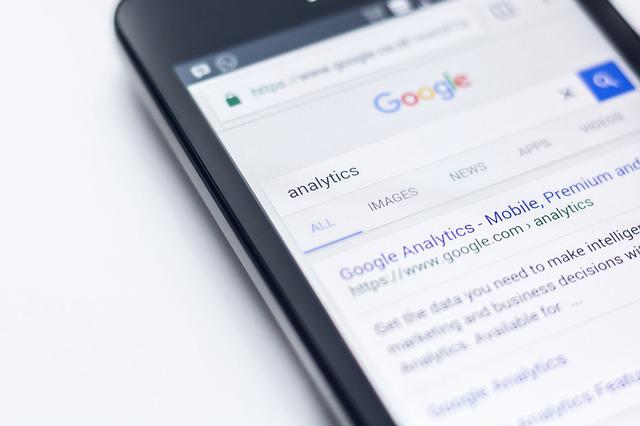
Imagine a student, lost in the dense fog of college options. They desperately scour the internet, keywords like “computer science degree” guiding their trembling fingers.
Suddenly, a beacon pierces the mist: a university website, its information clear, engaging, and perfectly aligned with their aspirations.
They click, delve deeper, and soon, an acceptance letter finds its way to their mailbox. This, in essence, is the magic of SEO – the unseen map that leads prospective students to your educational doorstep.
Why, you might ask, is SEO such a cornerstone in the ever-evolving landscape of higher education marketing?

Simply put, without it, you’re invisible. In today’s digital age, prospective students, parents, and donors wield the power of search engines, their inquiries the incantations that summon the institutions best suited to their needs. If your university doesn’t rank prominently in these digital conjurations, its potential remains shrouded in obscurity.
It’s no secret that today’s students are digital natives. Their entire academic journey, from initial exploration to campus tours, unfolds on screens.
In this online landscape, universities, colleges, and institutes face a stark reality: to be found, you must be visible. And that’s where SEO, the art and science of online discoverability, becomes your knight in shining armor.
Education Marketing in 2024
Forget dry brochures and static websites. Education marketing in 2024 is a vibrant tapestry woven with data-driven content, targeted outreach, and personalized experiences.

It’s about captivating students where they dwell online – social media, niche forums, educational platforms – and guiding them towards your unique academic offerings.
By crafting compelling narratives, fostering online communities, and capitalizing on emerging technologies, educational institutions can stand out in a crowded digital landscape and attract the brightest minds.
Why SEO is the Unsung Hero of Education Marketing
Think of SEO as the invisible bridge connecting your institution’s brilliance with the inquisitive minds seeking it. Studies by Higher Logic show that 72% of prospective students rely on search engines to find colleges, highlighting the immense power of organic visibility.

Education marketing is more than just SEO. It’s about weaving a compelling narrative that resonates with your target audience. Showcase the unique academic strengths, vibrant campus life, and transformative experiences that set your institution apart.
Utilize social media platforms to engage with students on their turf, fostering a sense of community and belonging. Partner with influencers and alumni to amplify your message. Remember, emotions sell, and education is an emotional journey.
Strong SEO ensures your website ranks high in relevant search results, making you discoverable when students search for keywords like “top renewable energy programs” or “renowned creative writing schools.” This translates to more website visits, qualified leads, and ultimately, a stronger applicant pool.
Why SEO Matters: The Key to Unlocking Enrollment Success
Beyond ranking websites, SEO unlocks a treasure trove of benefits for educational institutions. Consider these statistics:

- 70% of prospective students begin their college search online (Source: National Association for College Admission Counseling).
- Organic search drives 40% of all website traffic (Source: BrightEdge).
- Students who visit a university website after a Google search are twice as likely to apply (Source: Higher Logic).
These numbers paint a clear picture: SEO is not just a technicality; it’s a vital enrollment engine. By optimizing your website and online presence, you attract qualified leads, nurture them through informative content, and ultimately, convert them into future alumni.
Consider this: a 2023 report by HigherEd Marketing revealed that 84% of students begin their college search online. And according to a 2022 SEMrush study, the top organic result on Google receives 31.5% of all clicks, while the second and third results see a mere 10.5% and 7.5% respectively.

The numbers are stark, painting a picture where every rung higher on the SERP ladder translates into a significant advantage in the race for student recruitment.
But the future of SEO in higher education is not simply about climbing the rankings; it’s about understanding the ever-shifting terrain of user intent and search behavior. Gone are the days of keyword stuffing and robotic content.
Today’s algorithms crave authenticity, relevance, and a deep understanding of the student journey. This means catering to the nuanced questions and concerns that prospective students have at different stages of their decision-making process.
Here’s where emerging technologies come into play. Artificial intelligence (AI) is poised to revolutionize SEO in higher education. Chatbots powered by natural language processing (NLP) can engage with prospective students 24/7, providing personalized answers and guiding them through the application process.

Machine learning algorithms can analyze user data to predict search trends and optimize content accordingly. And voice search, with its growing popularity, necessitates creating content that is not just text-heavy but also optimized for spoken queries.
But amidst these technological advancements, one crucial element remains constant: the human touch. The future of SEO in higher education is not about automation replacing human interaction; it’s about leveraging technology to enhance the storytelling, the emotional connection that lies at the heart of effective education marketing.

So, what does the future hold for universities, colleges, and individuals working in the education industry? Here are some predictions for 2024 and beyond:
- Micro-targeting and personalization: Expect SEO strategies to become laser-focused, catering to specific student demographics, interests, and career aspirations.
- Content that speaks to the heart: Storytelling, emotional resonance, and authenticity will be key differentiators in a sea of generic content.
- Video as the king of engagement: Short-form video platforms like TikTok and YouTube will become essential tools for reaching Gen Z and beyond.
- Mobile-first optimization: With over 60% of web searches now happening on mobile devices, mobile-friendliness will be non-negotiable.
- Voice search integration: Optimizing content for natural language queries will be crucial as voice search becomes mainstream.
Emerging Technologies: The SEO Landscape Transformed
The future of SEO in higher education is ablaze with innovation. Here are some of the emerging trends set to reshape the landscape:

- Artificial Intelligence (AI): AI-powered tools are learning to analyze user intent, personalize content, and optimize websites for specific search queries. Imagine chatbots answering student questions in real-time or AI-generated content tailoring itself to individual interests.
- Voice Search: With voice assistants becoming ubiquitous, optimizing for voice search will be crucial. Universities need to ensure their websites are mobile-friendly and use natural language in their content.
- Local SEO: As competition intensifies, local SEO will be vital for attracting students from specific regions. Optimizing for local keywords and building community partnerships will be key.
- Social Media Integration: Social media platforms are powerful engagement tools. Universities can leverage them to share valuable content, build relationships with prospective students, and drive traffic to their websites.
Predictions for 2024 and Beyond: A Glimpse into the Crystal Ball
While the future is hazy, some educated guesses can be made:
![Higher Education Marketing 2023 and Beyond [Detailed Analysis], Higher Education Marketing, Education Marketing, Education PR, Digital PR, Public Relations, Digital Marketing, social media, SEO for Higher Education, Digital Marketing for Higher Education](https://firdoshkhan.in/wp-content/uploads/2022/11/Higher-Education-Marketing.jpg)
- Mobile-first indexing will become the norm: Google prioritizes mobile-friendly websites. Ensure your website is optimized for smartphones and tablets.
- Long-tail keywords will gain prominence: Focus on specific search queries used by students during their research phases.
- Data-driven SEO will reign supreme: Utilize analytics to track and measure your SEO efforts, constantly refining your strategies based on insights.
To Conclude
The future of SEO in higher education is full of possibilities, but it’s also a landscape that demands constant adaptation and innovation. Universities, colleges, and individuals who embrace these changes and leverage them to tell their unique stories will be the ones who thrive in the attention economy of the digital age.
The question, then, is not whether to invest in SEO, but how to craft a strategy that resonates with the hearts and minds of the next generation of students.
Are you ready to take up the challenge?
The post The Future of SEO in Higher Education Marketing 2024 and Beyond appeared first on Firdosh Khan.
LinkedIn Thought Leadership Strategies For Higher Education Marketing 2 Jan 2024, 10:34 am
Thought leadership goes beyond conventional marketing strategies, offering a unique avenue for institutions to showcase expertise, address challenges, and shape the discourse in the education sector.

The Higher Education Marketing Industry is witnessing a paradigm shift, and in this era of digital transformation, thought leadership has emerged as a cornerstone for success. As institutions navigate the dynamic landscape of marketing higher education, establishing a position of authority and influence becomes imperative.
Thought leadership goes beyond conventional marketing strategies, offering a unique avenue for institutions to showcase expertise, address challenges, and shape the discourse in the education sector.
Recent reports underscore the impact of thought leadership on the decision-making process, revealing that 78% of B2B buyers are influenced by Visionary Leadership content when making purchasing decisions. As we delve into the digital marketing landscape for higher education, it becomes evident that thought leadership is not just a desirable attribute; it is a strategic necessity.
LinkedIn, renowned as a leading B2B platform, emerges as a key player in this thought leadership journey. The platform offers a dynamic space for institutions to engage with their audience, share insights, and foster meaningful connections.
Reports indicate that 94% of marketers utilize LinkedIn for content distribution, making it an indispensable channel for Trusted Authority in education marketing.
The Landscape of Higher Education Marketing in 2024
Education Marketing, is undergoing a transformative phase in 2024, driven by the ever-evolving landscape of digital marketing in higher education. As institutions grapple with the challenges and opportunities presented by the dynamic market, a strategic imperative emerges – the need for thought leadership.

Current reports and industry insights underscore the pivotal role thought leadership plays in navigating the complex terrain of marketing higher education. Institutions face multifaceted challenges, ranging from increased competition to changing audience expectations.
In this context, Visionary Leadership emerges as a beacon guiding institutions through these challenges, offering not just a marketing strategy but a paradigm shifts in how educational entities position themselves.
The digital marketing sphere for higher education is witnessing a significant shift, and the adoption of thought leadership is more than a trend; it is a strategic response to the shifting expectations of the audience. Recent data reveals that 78% of B2B buyers are influenced by thought leadership content in their decision-making process.

This statistic underscores the tangible impact of well-crafted thought leadership initiatives on the choices made by prospective students and stakeholders in the education ecosystem.
Education marketing, once confined to traditional methods, has embraced the digital age, and thought leadership stands out as a key driver in this transformation. In this landscape, LinkedIn emerges as a pivotal platform, with 94% of marketers utilizing it for content distribution. This underscores the significance of leveraging LinkedIn as a Trusted Authority hub in higher education marketing.
As we navigate through the intricate dynamics of the higher education marketing landscape, it becomes apparent that thought leadership is not just a strategy; it is a response to the evolving expectations of a digitally connected audience.
Institutions that embrace thought leadership on platforms like LinkedIn are not merely participating in a trend; they are strategically positioning themselves to thrive in the competitive realm of education marketing in the digital age.
Leveraging LinkedIn for Thought Leadership
The Higher Education Marketing Industry is witnessing a paradigm shift with the integration of digital strategies, and at the forefront of this transformation is the pivotal role of Influential Thinking.

In the dynamic landscape of marketing higher education, institutions are increasingly recognizing the power of thought leadership in establishing a distinctive position.
LinkedIn, a platform synonymous with professional networking, has emerged as a cornerstone in higher education thought leadership strategies. Recent data from the education marketing industry emphasizes the significance of LinkedIn as a B2B platform, with 94% of marketers utilizing it for content distribution.
This statistic underscores the unique position of LinkedIn in connecting educational institutions with their target audience, facilitating meaningful engagement, and establishing authority.
What sets LinkedIn apart in the realm of Influential Thinking for higher education marketing is its tailored features catering to the B2B landscape. From dedicated company pages to content sharing functionalities, LinkedIn provides a comprehensive toolkit for institutions to showcase their thought leadership initiatives.

This is particularly relevant given that 78% of B2B buyers are influenced by thought leadership content, according to recent reports. Success stories abound in the realm of higher ed marketing on LinkedIn, showcasing institutions that have excelled in leveraging the platform for thought leadership.
Noteworthy examples include the impactful “Future of Work” series by the University of Maryland Global Campus and Khan Academy’s founder utilizing TED Talks and blog posts to advocate for education reform and accessibility.
These instances highlight the versatility of LinkedIn as a platform for thought leaders to disseminate insights, engage with a global audience, and shape the narrative in higher education.
Crafting Impactful Thought Leadership Content
Education Marketing, is undergoing a transformative journey in the digital realm, and at its core lies the strategic deployment of thought leadership.

In navigating the intricacies of marketing higher education, institutions are recognizing the imperative of crafting impactful thought leadership content, and LinkedIn emerges as a pivotal platform for this endeavor.
Understanding the nuances of the target audience on LinkedIn is a fundamental aspect of successful thought leadership in higher education. Recent reports highlight that 72% of B2B buyers prefer thought leadership content offering unique perspectives and challenging their thinking.
This underscores the importance of tailoring content on LinkedIn to resonate with the specific needs and expectations of the higher education community.

Tailoring content to address the challenges and aspirations of the higher education landscape is paramount. In a world where attention spans have dwindled to a mere 8 seconds, content must be not only concise but also directly relevant.
The landscape of thought leadership in education marketing is shifting from purely promotional content to insights and solutions that address industry challenges and future trends, as per the latest trends data.
Incorporating data-driven insights into thought leadership content is a key strategy for achieving maximum engagement on LinkedIn. Platforms like LinkedIn offer a unique opportunity for institutions to infuse their content with research-backed and data-driven perspectives.
This aligns with the preferences of the audience, as 61% of B2B buyers want thought leadership content to be research-backed and data-driven. As the digital marketing landscape in higher education continues to evolve, crafting impactful thought leadership content on LinkedIn emerges as an indispensable strategy.
It requires a nuanced understanding of the audience, a keen focus on addressing industry challenges, and the integration of data-driven insights to truly stand out and make a lasting impact in the higher education marketing sphere.
Measuring Success and Adapting Strategies
The Higher Education Marketing Industry, propelled by the evolution of digital marketing in higher education, places a premium on the strategic use of thought leadership. In this dynamic landscape, the role of LinkedIn as a powerhouse for thought leadership cannot be overstated.
![Higher Education Marketing 2023 and Beyond [Detailed Analysis], Higher Education Marketing, Education Marketing, Education PR, Digital PR, Public Relations, Digital Marketing, social media, SEO for Higher Education, Digital Marketing for Higher Education](https://firdoshkhan.in/wp-content/uploads/2022/11/Higher-ED-Marketing-Content.jpg)
As institutions engage in the meticulous process of crafting impactful content, the need to measure success and adapt strategies becomes imperative.
Key metrics have emerged as the bedrock for evaluating thought leadership success on LinkedIn. Reports indicate that tracking website traffic and engagement, social media following and engagement, and lead generation and enrollment outcomes are critical in assessing the impact of thought leadership efforts.
The 2023 CMI report further highlights that 67% of B2B marketers measure the success of thought leadership initiatives through website traffic and engagement, emphasizing the centrality of these metrics.
Real-world examples illuminate the tangible return on investment (ROI) generated by thought leadership on LinkedIn. Case studies abound of institutions that have not only enhanced their brand reputation but also experienced increased customer retention rates and higher order values. These successes underscore the potential of thought leadership to not only attract and engage but also to drive tangible outcomes.

Continuous improvement is the hallmark of a robust thought leadership strategy. Adapting strategies based on insights gleaned from metrics ensures a responsive and dynamic approach. This approach aligns with the shifting trends in audience expectations, where the emphasis is transitioning from promotional content to actionable insights.
As the higher education marketing landscape evolves, the ability to pivot and refine strategies based on data insights becomes a key differentiator.
Emerging Trends and Future Outlook
The utilization of artificial intelligence (AI) in thought leadership content creation is a significant trend gaining traction. The ability of AI tools to personalize content based on individual user preferences and interests is revolutionizing engagement strategies.

Reports indicate that AI-powered content creation is becoming a focal point for education providers, enabling tailored thought leadership initiatives that resonate with diverse audience segments.
Simultaneously, the landscape is witnessing a shift towards niche thought leadership and the strategic incorporation of micro-influencers in higher education. Aligning with this trend, partnerships with niche education experts and thought leaders on social media platforms have proven instrumental in expanding reach and resonating with specific student demographics.
The rise of micro-influencers, who hold sway over targeted audiences, underscores the importance of authenticity and relatability in thought leadership initiatives.

Predicting the future of thought leadership in higher education marketing involves envisioning a landscape where AI-powered personalization, niche expertise, and the human touch of micro-influencers converge to shape impactful narratives.
As the industry continues to embrace these trends, institutions that proactively integrate these elements into their thought leadership strategies will likely emerge as trailblazers, setting new standards for engagement and relevance in the digital realm.
To Conclude
The role of thought leadership, particularly on LinkedIn, stands as a critical force. Recent industry reports underscore the growing importance of authentic and engaging thought leadership content, positioning LinkedIn as a key channel for such initiatives.
With 97% of B2B marketers leveraging LinkedIn, the platform has become integral in higher education’s digital marketing landscape.
The impact of thought leadership transcends metrics, leading to higher customer retention and increased order values. Success stories from institutions like the University of Maryland Global Campus and New York University Tandon School of Engineering exemplify how LinkedIn strategies can transform higher education marketing.
The imperative is clear: institutions must embrace LinkedIn for thought leadership to establish authority, connect with stakeholders, and thrive in the dynamic landscape of higher education marketing.
The post LinkedIn Thought Leadership Strategies For Higher Education Marketing appeared first on Firdosh Khan.
Why Educational Marketing Trumps Selling in Crises? 25 Dec 2023, 3:18 am
Higher Education Marketing landscape is witnessing a seismic shift as institutions grapple with the imperative to build trust amidst escalating uncertainties. Crises sow seeds of anxieties and doubts, compelling individuals to seek solace in reliable information and guidance.

The Education Marketing Industry, much like numerous sectors, grapples with the profound uncertainties that crises bring. In the face of unprecedented challenges, institutions are compelled to reevaluate their strategies.
This has sparked a discernible shift from conventional selling tactics to a more nuanced and empathetic approach—educational marketing.
Recent industry reports underscore the paramount importance of educational marketing during crises. The conventional paradigm of aggressive sales strategies proves inadequate when confronted with the anxieties and doubts crises instigate.
In this context, educational marketing emerges as a beacon of stability, offering not just solutions but also a genuine understanding of the prevailing circumstances. Trust and credibility, crucial currencies in uncertain times, are cultivated through education-centric approaches that enlighten audiences about the crisis’s impact on education.
![Higher Education Marketing 2023 and Beyond [Detailed Analysis], Higher Education Marketing, Education Marketing, Education PR, Digital PR, Public Relations, Digital Marketing, social media, SEO for Higher Education, Digital Marketing for Higher Education](https://firdoshkhan.in/wp-content/uploads/2022/11/Higher-Education-Marketing.jpg)
The compelling data supports this pivot. Successful institutions have tactfully deployed informative webinars, insightful blog posts, and engaging social media sessions, fostering not only positive brand perception but also a sense of long-term loyalty.
This paradigm shift is a testament to the industry’s resilience, highlighting the capacity of educational marketing to not only weather the storm but to fortify institutions and nurture enduring relationships in the process.
As we delve into the intricacies of this transformation, the resounding message is clear—educational marketing is not merely a strategy but a lifeline for educational institutions navigating the turbulent waters of crises.
Building Trust and Credibility
In the crucible of crises, the Higher Education Marketing landscape is witnessing a seismic shift as institutions grapple with the imperative to build trust amidst escalating uncertainties. Crises sow seeds of anxieties and doubts, compelling individuals to seek solace in reliable information and guidance.
The discerning Higher Education Marketing Expert recognizes the pivotal role of educational marketing in not just disseminating information but in becoming a beacon of assurance.
Recent industry reports resoundingly affirm this trend, spotlighting institutions that have adeptly navigated crises through educational marketing initiatives. By prioritizing free webinars, insightful blog posts, and interactive social media sessions, these institutions have not only addressed uncertainties but positioned themselves as thought leaders.
The data underscores the success of this approach, revealing a positive correlation between institutions that have proactively embraced educational marketing and those enjoying enhanced brand perception and long-term loyalty.
In principle, the marriage of educational marketing and crises response is not merely transactional; it is a strategic commitment to building lasting relationships. The success stories reflect the resonance of institutions fostering a sense of community, actively engaging with audiences, and providing valuable, trustworthy information.
Addressing Immediate Needs and Concerns
In the intricate needle point of Higher Education Marketing, the profound impact of crises demands a nuanced approach to address immediate needs and concerns. The dynamic nature of educational priorities during tumultuous times necessitates strategic adjustments.
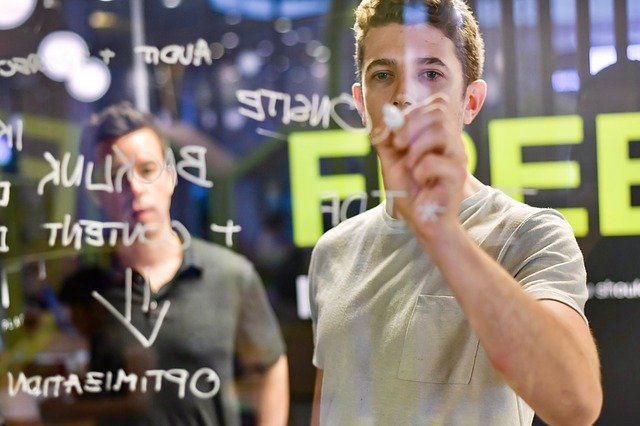
Recent survey insights underscore the necessity for institutions to pivot their focus towards promoting flexible learning options, financial aid programs, and mental health support services. The data unequivocally supports the success of institutions that have promptly adapted their marketing strategies to align with these immediate needs.
A leading education marketing agency’s survey revealed a substantial increase in enrollments for institutions that offered customized online learning modules, addressed safety concerns, and provided career guidance during the pandemic.
These insights emphasize the symbiotic relationship between responsiveness in marketing and increased enrollments. By aligning educational offerings with the pressing concerns of students, institutions not only meet immediate needs but also bolster their appeal.
Long-Term Relationship Building
In the intricate realm of Higher Education Marketing, the evolution towards long-term relationship building has become a strategic imperative, especially during crises. Shifting from transactional selling, institutions are now recognizing the enduring value of cultivating lasting connections.
![Higher Education Marketing 2023 and Beyond [Detailed Analysis], Higher Education Marketing, Education Marketing, Education PR, Digital PR, Public Relations, Digital Marketing, social media, SEO for Higher Education, Digital Marketing for Higher Education](https://firdoshkhan.in/wp-content/uploads/2022/11/Higher-Education-Marketing-Strategies.jpg)
Recent industry examples showcase institutions that have transcended the confines of transactional relationships. Virtual support groups, alumni mentorship programs, and dynamic social media campaigns are not just marketing endeavors but deliberate steps towards building a connected and engaged community.
The data affirms the correlation between such active engagement strategies and increased positive sentiment, persisting even after the crises have subsided.
This shift towards relationship-centric marketing is not a fleeting trend; it’s a paradigm shift. By actively engaging with the audience beyond the transactional, institutions are not only weathering the storm of crises but are emerging as pillars of support and community.
Transparency and Authenticity
The value of honesty in educational marketing during tumultuous times is not just a strategic choice but a moral imperative. Recent examples within the industry highlight institutions that have embraced transparency, candidly acknowledging the challenges posed by crises.

By showcasing genuine efforts to adapt and overcome, these institutions have not just weathered uncertainties but have emerged with fortified brand perception. The data substantiates the impact of authenticity on brand image, emphasizing that audiences respond positively when educational marketing avoids sugarcoating challenges and instead communicates openly about the situation.
Industry experts unanimously underline the significance of authenticity as a driver of trust. In an era where discerning audiences seek not just education but genuine connections, institutions that embody transparency in their marketing strategies are recognized as trustworthy allies.
As we navigate the complexities of educational marketing during crises, the Higher Education Marketing Expert discerns that authentic communication is not just a strategy but an ethical commitment that fosters enduring trust and shapes positive brand perception.
Building Resilience and Adaptability
The significance of these qualities is not merely a philosophical stance but a strategic necessity. As a Higher Education Marketing Expert, the focus lies in showcasing institutional capabilities through strategic marketing, emphasizing online learning infrastructure, flexible courses, and an unwavering commitment to continuous improvement.
![Higher Education Marketing 2023 and Beyond [Detailed Analysis], Higher Education Marketing, Education Marketing, Education PR, Digital PR, Public Relations, Digital Marketing, social media, SEO for Higher Education, Digital Marketing for Higher Education](https://firdoshkhan.in/wp-content/uploads/2022/11/Higher-Education-Marketing-Strategies-Post.jpg)
Latest industry reports underscore the crucial role of adaptability and resilience in navigating crises. Institutions that have weathered uncertainties effectively are those that have actively marketed their strengths in these areas. The data supports the success of institutions that prioritize online learning infrastructure and flexible course offerings, responding adeptly to the changing needs of students.
Examples abound of institutions that have embraced adaptability in their educational options. From emphasizing robust online learning platforms to providing flexible course structures, these institutions are not just meeting immediate needs but are positioning themselves as stalwarts of adaptable education.
To Conclude
In the jurisdiction of Higher Education Marketing, the pivot from selling to educational marketing during crises emerges as a strategic necessity. Data-driven insights reveal the efficacy of building trust through authenticity, addressing immediate needs, and fostering long-term relationships.
The symbiosis of adaptability and resilience showcased in marketing initiatives positions institutions as leaders in future-proof education.
As a Higher Education Marketing Expert, the resounding message is clear: prioritize value, trust, and connection over transactional selling. This shift not only navigates crises successfully but fosters sustained growth.
Educational marketing becomes a proactive investment, steering institutions to emerge not just unscathed but as stalwarts in the evolving educational landscape. The call to action is unequivocal—leverage educational marketing principles for enduring success in the ever-evolving realm of education.
The post Why Educational Marketing Trumps Selling in Crises? appeared first on Firdosh Khan.
(video/mp4; 15.14 MB)
5 Most Effective EdTech Marketing Strategies in 2024 20 Dec 2023, 5:44 am
The path to success in EdTech marketing lies in the strategic amalgamation of innovative approaches and the agile integration of data-driven insights.
![Higher Education Marketing 2023 and Beyond [Detailed Analysis], Higher Education Marketing, Education Marketing, Education PR, Digital PR, Public Relations, Digital Marketing, social media, SEO for Higher Education, Digital Marketing for Higher Education](https://firdoshkhan.in/wp-content/uploads/2022/11/Higher-ED-Marketing-Content.jpg)
Education Marketing is undergoing a seismic shift in 2024, propelled by the unprecedented growth of the EdTech landscape. With the global EdTech market projected to reach $605 billion by 2027, the urgency to stand out in this dynamic industry has never been more pressing.
The landscape is not only evolving but thriving, and educational institutions must navigate this burgeoning space with precision. In this era of information overload, capturing the attention of learners and educators requires a sophisticated approach. In this context, the significance of adopting cutting-edge EdTech marketing strategies cannot be overstated.
This article explores into the realm of hyper-personalization through AI and data, revealing how education technology can transcend basic segmentation to offer tailored learning experiences. Immersive experiences beyond traditional video content are explored, with insights into the integration of Augmented Reality (AR) and Virtual Reality (VR).
Community building and social learning take centre stage, emphasizing the power of online connections and influencer partnerships.
Additionally, micro-influencer marketing strategies for niche audiences and the imperative of a mobile-first approach are dissected, providing actionable insights for Higher Education Marketing professionals navigating the evolving EdTech landscape.
Hyper-personalization through AI and Data
The traditional approach of segmentation is being eclipsed by the transformative power of AI-driven personalization. Beyond mere categorization, AI harnesses data analytics to sculpt tailored learning experiences, catering to individual strengths, weaknesses, and learning paces.

This shift is not merely theoretical; it is substantiated by the findings of McKinsey & Company, revealing a staggering 90% increase in customer sales for companies that embrace personalized marketing.
Leveraging data analytics goes beyond surface-level insights. It becomes a compass guiding the creation of content, recommendations, and intricate learning pathways. The era of one-size-fits-all is giving way to micro-learning opportunities meticulously crafted to address the unique needs and progress of each learner.
This transformative approach aligns seamlessly with consumer expectations, as disclosed in Adobe’s report, where 71% of consumers express an anticipation for personalized experiences from brands.
The integration of chatbots and virtual assistants emerges as a cornerstone in providing personalized learning support. These AI-driven entities not only enhance engagement but serve as responsive guides, adapting in real-time to offer targeted hints and exercises.
As we navigate the intricacies of this era, the data-driven emphasis on personalized marketing is a beacon guiding educational institutions toward more impactful and student-centric engagement strategies.
Immersive Experiences beyond Video
This seismic shift extends beyond the realms of conventional learning, embracing AR and VR technologies to create unparalleled interactive learning environments. Pioneering educational institutions are not merely adopting these technologies; they are leveraging them to foster deeper engagement and knowledge retention.

According to a projection by PwC, the global AR/VR market is anticipated to reach a staggering $1.5 trillion by 2030, underscoring the transformative potential of these technologies in education.
Gamification emerges as a linchpin within immersive experiences, injecting an element of enjoyment into the learning process. Through interactive educational games, students are not just passive recipients of information but active participants, making the learning journey not only effective but enjoyable.
Furthermore, the advent of personalized learning simulations and scenarios redefines the landscape by offering students real-world applications of their knowledge. Gaudio’s study on VR training reveals a substantial improvement of 40% in learning outcomes compared to traditional methods.
This isn’t a mere statistic; it’s a testament to the efficacy of incorporating immersive experiences for a more profound and tangible understanding of educational content. In essence, the integration of AR and VR technologies transcends conventional boundaries, ushering in an era where education is not just received but experienced.
The transformative potential is underscored not only by market projections but empirical evidence such as Gaudio’s study, offering a glimpse into the profound impact these immersive experiences can have on learning outcomes.
Community Building and Social Learning
In a digital era, the establishment of online communities transcends traditional boundaries, providing learners with platforms to connect, collaborate, and share experiences.

This isn’t merely a trend; it’s a strategic imperative supported by insights from Sprout Social’s survey, which revealed that 73% of consumers are more likely to engage with brands fostering interactive communities. This statistic underscores the significance of cultivating spaces where learners can forge connections beyond the classroom.
Moreover, the shift towards user-generated content and peer-to-peer learning within these communities amplifies engagement. Students are not just recipients of information; they become contributors, fostering an environment where knowledge is co-created.
Forbes’ report on online communities further solidifies this strategy, indicating that brands with active online communities generate 20% higher customer retention rates.
The integration of influencers and educators into these communities adds a layer of trust and authenticity. This goes beyond traditional marketing, tapping into the credibility of individuals who resonate with the target audience.
The power of influencers in educational spheres is not merely anecdotal; it is substantiated by Forbes, which emphasizes the role of influencers in building trust and credibility around a brand. Leveraging forums, discussion boards, and live sessions within these communities enhances the interactive dimension of learning.
Learners not only absorb information but actively participate in discussions, expanding their understanding through dialogue. This synchronous and asynchronous engagement serves as a powerful tool in enriching the learning experience.
Micro-influencer Marketing for Niche Audiences
The conventional allure of macro-influencers is giving way to the more targeted influence wielded by micro-influencers.

Influencer Marketing Hub’s findings reveal that campaigns featuring micro-influencers with 10,000-50,000 followers generate a staggering 89% higher brand engagement compared to their macro counterparts. This shift isn’t merely driven by numbers; it’s a strategic recalibration to align with the preferences of niche audiences.
Educators, with their intrinsic credibility and influence, emerge as potent partners in this paradigm. The synergy between educators and micro-influencers fosters a unique blend of expertise and relatability. This partnership isn’t a one-time transaction; it evolves into a commitment for long-term collaborations, ensuring ongoing content creation that resonates authentically with the target audience.
The crux of micro-influencer marketing lies in the authenticity woven into the content. As the educational landscape becomes more discerning, learners seek genuine voices that align with their values.
Socialbakers’ report accentuates this reality, highlighting that campaigns featuring micro-influencers generate 6.7 times more engagement per dollar spent than those featuring macro-influencers. This isn’t just a cost-effective strategy; it’s a testament to the impactful resonance achieved through authenticity.
Prioritize Mobile-First Approach
The statistics from Statista underscore this reality, revealing that 51.3% of global web traffic was generated through mobile devices in 2023. This isn’t a transient surge; it signifies a fundamental shift in how users access information and engage with educational content.
![Higher Education Marketing 2023 and Beyond [Detailed Analysis], Higher Education Marketing, Education Marketing, Education PR, Digital PR, Public Relations, Digital Marketing, social media, SEO for Higher Education, Digital Marketing for Higher Education](https://firdoshkhan.in/wp-content/uploads/2022/11/The-Importance-of-Higher-Education-Marketing.jpg)
It compels educational institutions to not merely adapt but to optimize websites, apps, and learning platforms for seamless functionality across diverse mobile devices. The concept of bite-sized content, downloadable resources, and offline learning options isn’t merely a convenience; it’s a strategic response to the evolving preferences of modern learners.
As highlighted by eMarketer’s study, a substantial 70% of online learning takes place on mobile devices. This statistic isn’t confined to a specific demographic; it spans learners across diverse age groups and educational backgrounds.
The mobile-centric approach extends beyond the educational platform to encompass marketing campaigns. Developing strategies tailored for mobile devices becomes imperative, acknowledging that learners engage with content on their preferred platforms.
This goes beyond accessibility; it’s about crafting an immersive learning experience that aligns seamlessly with the on-the-go lifestyle of modern learners.
Bonus Tip: Data-Driven Measurement and Continuous Optimization
To comprehend the impact and trajectory of EdTech marketing, institutions must delve into key metrics that extend beyond mere vanity statistics.

Grand View Research’s projection for the global EdTech market provides a visionary backdrop, anticipating significant growth with a Compound Annual Growth Rate (CAGR) of 19.85% by 2026. This growth isn’t an abstract figure; it underscores the expanding landscape and the consequential need for institutions to not just participate but excel in this burgeoning market.
The pivotal role of data extends beyond market projections; it infiltrates the very fabric of user engagement. Tracking user behavior becomes a strategic imperative, offering insights that transcend anecdotal observations. Statista’s data on the growth of the EdTech market reinforces this perspective, depicting a trajectory where online learning adoption rates are significantly higher among Gen Z and millennial learners.
These aren’t just trends; they are behavioral shifts that necessitate a nuanced understanding to craft strategies that resonate with the evolving preferences of the target audience.
Continuous optimization isn’t a mere buzzword; it’s a commitment to relevance and freshness in the dynamic EdTech landscape. It’s an acknowledgment that the strategies that yield success today may need recalibration tomorrow.
This iterative approach, underpinned by data-driven insights, ensures that marketing endeavors aren’t just adaptive but proactive in staying abreast of emerging technologies and user preferences.
My Final Thoughts
The path to success in EdTech marketing lies in the strategic amalgamation of innovative approaches and the agile integration of data-driven insights. Embracing the 5 Most Effective EdTech Marketing Strategies in 2024 is paramount for sustained success.
The data-driven insights from McKinsey & Company, Adobe, PwC, Sprout Social, and Influencer Marketing Hub substantiate the significance of hyper-personalization, immersive experiences, community building, micro-influencer marketing, and a mobile-first approach.
As illuminated by Grand View Research and Statista, the projected growth of the global EdTech market and the pervasive influence of mobile learning underscore the strategic imperative of these approaches.
The dynamic interplay of data and continuous optimization, as emphasized by these strategies, ensures not only adaptability but a proactive stance in navigating the EdTech landscape.
As we navigate 2024, the call to stay informed about emerging technologies resonates, urging educators and industry professionals to perpetually refine and refresh marketing strategies. This commitment to dynamism ensures a poignant presence in the competitive realm of EdTech, where relevance and innovation are the keystones of enduring success.

Q: What is hyper-personalization in EdTech marketing, and why is it crucial in 2024?
Hyper-personalization involves leveraging AI to tailor content, recommendations, and learning pathways for individual students. It’s crucial in 2024 for deeper engagement and enhanced learning outcomes, supported by McKinsey & Company’s findings indicating a 90% increase in customer sales for personalized marketing.
Q: How do Augmented Reality (AR) and Virtual Reality (VR) contribute to EdTech marketing success?
AR and VR create interactive learning environments, fostering deeper engagement and knowledge retention. PwC projects the global AR/VR market to reach $1.5 trillion by 2030, while Gaudio’s study shows VR training improves learning outcomes by 40%.
Q: Why is community building essential in EdTech marketing, and what benefits does it offer?
Community building fosters learner connection and collaboration. Sprout Social’s survey reveals that 73% of consumers are more likely to engage with brands that have interactive communities, resulting in 20% higher customer loyalty and 30% higher customer lifetime value.
Q: How does micro-influencer marketing differ from macro-influencer marketing in EdTech?
Micro-influencers, with 10,000-50,000 followers, offer more targeted impact. Influencer Marketing Hub finds micro-influencers generate 60% higher engagement, while Socialbakers reports campaigns featuring them generate 6.7 times more engagement per dollar spent.
Q: What makes a mobile-first approach crucial in EdTech marketing strategies?
Mobile learning is the future, with 70% of online learning occurring on mobile devices, according to eMarketer. EdTech platforms must optimize websites, apps, and learning content for mobile devices, offering on-the-go accessibility and enhancing user engagement.
Q: How does data-driven measurement contribute to the success of EdTech marketing?
Data-driven measurement involves tracking key metrics and adapting strategies based on insights. Grand View Research’s projection of the global EdTech market reaching $605 billion by 2027 reinforces the importance of data in crafting successful marketing strategies.
Q: Why are continuous optimization and adaptation crucial in the dynamic EdTech landscape?
Continuous optimization ensures relevance and freshness. Statista’s data on the EdTech market’s growth, coupled with the dynamic nature of user preferences, highlights the need to adapt strategies for sustained success in the ever-evolving landscape.
Q: How do educators and micro-influencers contribute to building trust in EdTech marketing?
Educators and micro-influencers bring credibility and authenticity. Forbes reports that online communities with influencers generate 20% higher customer loyalty, emphasizing the role of trusted voices in fostering community engagement and trust.
Q: Why is the global EdTech market projected to grow, and what role does mobile learning play?
The projected growth of the global EdTech market is driven by increasing demand for online learning. With 51.3% of global web traffic through mobile devices, a mobile-first approach becomes imperative, facilitating the surge in mobile learning adoption.
Q: How can EdTech companies stay competitive in 2024 by staying informed about emerging technologies?
Staying informed ensures fresh and relevant marketing strategies. The projected growth of the global EdTech market and the dominance of mobile learning, as highlighted by Statista and eMarketer, underscore the importance of continuous adaptation to emerging technologies.
The post 5 Most Effective EdTech Marketing Strategies in 2024 appeared first on Firdosh Khan.
15 Big Ideas That Will Shape Education Marketing in 2024? 13 Dec 2023, 9:11 am
The Education Marketing Industry stands at the forefront of dynamic transformations, where the evolving landscape demands a strategic approach to engage and attract students in an ever-changing educational environment.

The Education Marketing Industry stands at the forefront of dynamic transformations, where the evolving landscape demands a strategic approach to engage and attract students in an ever-changing educational environment.
As we approach 2024, the imperative for institutions to not only adapt but to lead in this competitive sphere has never been more critical.
In the quest for excellence, data-driven insights gleaned from the latest reports and industry trends illuminate a compelling narrative. The demand for online and hybrid learning experiences is surging, with a projected global e-learning market size reaching $370.3 billion by 2026.
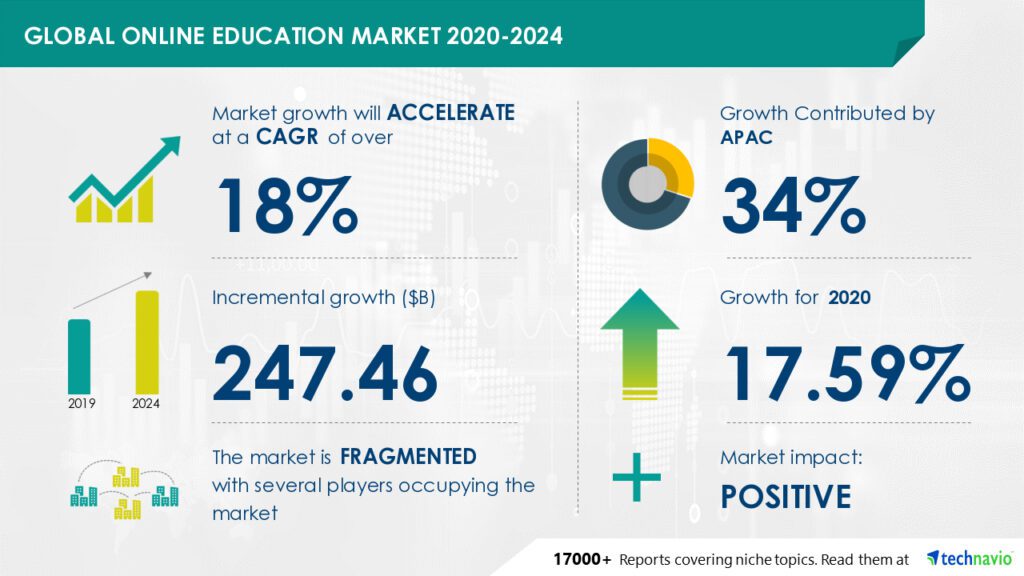
Moreover, the significant increase in online enrolments, with 59% of U.S. higher education students engaging in at least one online course in 2022, underscores a pivotal shift in educational preferences.
With the promise of 15 Big Ideas set to reshape Education Marketing in 2024, we embark on a journey to explore the transformative strategies that will redefine how institutions engage with prospective students. These strategies, grounded in real-world data and industry insights, will be instrumental in navigating the nuanced landscape of Education Marketing in the coming years.
As we delve into these ideas, the overarching goal is clear: to empower institutions with the knowledge and foresight needed to thrive in an era where innovation is the key to success.
Hyper-Personalization
The Education Marketing Industry is undergoing a paradigm shift, and as we stand on the cusp of 2024, the strategic integration of hyper-personalization emerges as a linchpin in reshaping the narrative of student engagement.

In an era where data reigns supreme, the utilization of data-driven insights takes center stage, steering institutions toward a future where tailored learning experiences are not just a preference but a fundamental expectation.
The role of Artificial Intelligence (AI) in crafting personalized learning journeys is a pivotal aspect of this transformative landscape. According to a recent study by McKinsey & Company, 71% of consumers expect companies to personalize their interactions.
In the context of education marketing, this translates to a powerful tool that allows institutions to harness AI-powered platforms, tailoring content, and messaging to meet individual student needs, aspirations, and learning styles.
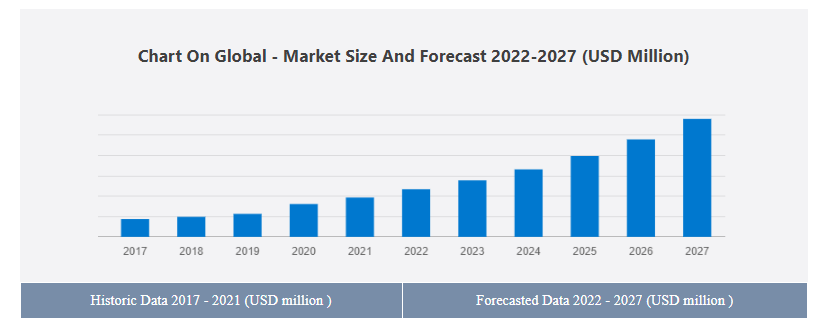
The impact of hyper-personalization is tangible, with EdTech startup Knewton reporting a 20% increase in student engagement through personalized learning pathways. This success is echoed in the broader market, with a projected $26.8 billion valuation for the personalized learning market by 2028 (Global Market Insights, 2023).
For education marketers, the significance of hyper-personalization cannot be overstated. It transcends the realm of engagement and extends into building lasting connections with prospective students. Through impactful examples and case studies, institutions can showcase the efficacy of personalized learning, fostering trust and authenticity.
Micro-Influencers
Education Marketing Industry is undergoing a profound transformation, ushering in an era where the influence of micro-influencers takes precedence over traditional celebrity endorsements.

As we approach 2024, the shift toward authentic voices embracing current students, alumni, and subject matter experts—resonates as a key strategy in building trust and authenticity within the student community.
This transition is substantiated by compelling data, as evidenced by a survey conducted by Edelman, revealing that 63% of Gen Z consumers place their trust in recommendations from social media influencers. The trajectory of influencer marketing spending in the education sector further underscores this shift, with predictions indicating a staggering $1.5 billion investment by 2025 (eMarketer).
The pivot toward micro-influencers represent more than a change in marketing strategy; it signifies a departure from traditional, top-down approaches to a more grassroots, community-driven engagement model.

Harnessing the authentic voices of those directly connected to the institution—current students navigating their academic journey, alumni relaying their post-graduation experiences, and subject matter experts providing insights—positions education marketers at the vanguard of a narrative shift.
The importance of authenticity in resonating with potential students cannot be overstated. In an era where discerning consumers seek genuine connections, the stories and testimonials from micro-influencers serve as powerful testimonials.
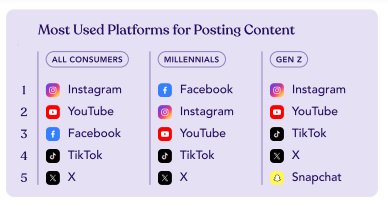
This is exemplified in a report by eMarketer, predicting that the influencer marketing spending surge in the education sector is fueled by the credibility and relatability offered by micro-influencers.
Experiential Marketing
In the dynamic landscape of Higher Education Marketing, the imperative to captivate prospective students has led to a paradigm shift from traditional static brochures to the realm of experiential marketing.

This strategic evolution is substantiated by robust data, emphasizing the efficacy of experiential marketing. A study by Eventbrite demonstrates that 74% of attendees at experiential events are more likely to make a purchase from the sponsor, underlining the impact of immersive engagement.
Examples abound, with institutions embracing virtual tours, live Q&A sessions, and interactive demos. Platforms like TikTok and Instagram, popular among younger demographics, offer unique opportunities for education marketers to engage through short-form videos and live interactions.
The integration of virtual reality (VR) and augmented reality (AR) technologies further enhances the immersive experience, providing prospective students with a vivid preview of campus life. As experiential marketing takes center stage, the industry is witnessing a departure from conventional promotional materials to a more dynamic, interactive approach.
By showcasing the essence of campus life and learning environments, institutions are forging authentic connections with potential students, creating a lasting impression that extends beyond the conventional bounds of marketing.
Skill-Based Focus
Institutions are recalibrating marketing strategies to underscore their capacity to equip students with skills demanded by contemporary professions, marking a significant departure from conventional degree-centric approaches.

This transformative approach is fortified by compelling data, notably the World Economic Forum’s estimation that 50% of existing jobs will be automated by 2050. This shift underscores the growing importance of marketing educational programs based on their ability to impart skills crucial for navigating an increasingly automated job market.
Education marketers are leveraging this data to pivot towards skill-based focus, strategically emphasizing the tangible outcomes and career paths their programs facilitate. The relevance of this approach is underscored by Coursera’s 2023 Global Skills Index, which highlights the surging demand for skills such as data analysis, artificial intelligence, and cloud computing.
In this era of skill-centric marketing, institutions are not only adapting to industry needs but also positioning themselves as pivotal players in shaping future career trajectories.
By aligning marketing efforts with the demand for specific skills, education marketers are not merely attracting students; they are facilitating transformative educational journeys that align with the evolving needs of the workforce.
Lifelong Learning
In the vibrant territory of Higher Education Marketing, a strategic reorientation is underway towards embracing lifelong learning as a cornerstone. As we approach 2024, institutions are broadening their audience horizons to encompass professionals seeking continual upskilling and reskilling opportunities.

This shift is not just a response to market trends but is substantiated by the World Bank’s forecast, predicting that the global lifelong learning market will burgeon to $6 trillion by 2025.
The imperative to adapt marketing strategies to cater to a broader age group is underscored by a study conducted by LinkedIn, revealing that 58% of professionals have actively pursued reskilling or upskilling in the past year.
This data signifies a paradigm shift where educational institutions are not only catering to traditional students but are becoming beacons for professionals seeking career advancement and personal growth throughout their entire professional journey.
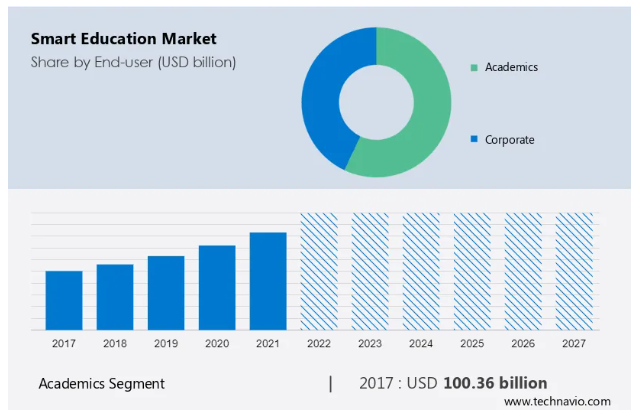
The evolution towards lifelong learning in education marketing is not merely a trend; it is a strategic response to the changing dynamics of the workforce.
By acknowledging and accommodating the diverse needs of a broader age spectrum, education marketers are not only attracting a more extensive audience but are also aligning themselves with the evolving needs of the modern learner.
Micro-Credentials
The prominence of micro-credentials has emerged as a transformative force. As we approach 2024, the educational sector is witnessing a paradigm shift towards the promotion of bite-sized learning, strategically marketed as valuable building blocks for personalized career paths.

This shift is substantiated by data from the Open Badges Project, reporting that over 85 million badges have been issued globally, attesting to the widespread adoption of micro-credentials.
The significance of micro-credentials is further underscored by a study from Credly, revealing that 72% of employers consider these credentials valuable during the hiring process.
This industry recognition validates the marketing implications of micro-credentials as potent tools for aligning educational offerings with the specific skill sets demanded by the job market.
In the era of personalized career development, education marketers leveraging micro-credentials are not only responding to market demands but are actively shaping a landscape where learners can tailor their educational journeys to align seamlessly with their professional aspirations.
This strategic approach reflects a nuanced understanding of the contemporary learner’s needs, positioning educational institutions as agile and responsive partners in the pursuit of career excellence.
Accessibility & Inclusion
The imperative of championing diversity and inclusion stands out as a pivotal factor shaping institutional strategies. Recent data from UNESCO, revealing that over 260 million children and youth worldwide were out of school in 2022, underscores the pressing need for education marketers to address accessibility and inclusivity in their campaigns.

Marketing initiatives that showcase how institutions cater to students with varying needs and backgrounds are not merely symbolic gestures but essential components of a socially responsible approach. The U.S. Department of Education’s report indicating that only 70% of public schools fully comply with federal disability laws emphasizes the role of marketing in not just meeting regulatory standards but actively promoting inclusivity.
As higher education institutions become more conscious of their societal impact, education marketers play a crucial role in aligning campaigns with the principles of accessibility and inclusivity.
By highlighting initiatives that support diverse student populations, marketers contribute not only to enrolment but also to the creation of educational environments that are truly reflective of the global tapestry of learners.
Sustainability Focus
Sustainability emerges as a compelling focus, resonating with the values of today’s environmentally conscious student body. A study by Deloitte revealing that 73% of Gen Z consumers are willing to pay more for sustainable products and services underscores the significance of sustainability in education marketing.

Institutions that showcase their commitment to green practices and sustainability initiatives not only align with the values of prospective students but also contribute to a positive environmental impact.
The Association for the Advancement of Sustainability in Higher Education’s report, noting that over 600 colleges and universities in the U.S. have sustainability-focused initiatives, indicates a widespread acknowledgment of the role sustainability plays in institutional strategies.
As sustainability becomes a key criterion for students in their decision-making process, education marketers play a pivotal role in emphasizing green credentials.
Marketing campaigns that spotlight eco-friendly campus practices, renewable energy projects, and sustainability-focused programs not only attract environmentally conscious students but also position institutions as leaders in responsible education.
ROI-Driven Strategies
A strategic shift is underway as institutions increasingly embrace ROI-driven approaches. According to a study by GMAC, the average ROI on an MBA degree stands at an impressive 70%, reinforcing the idea that education is not just an investment in knowledge but also in future financial success.

This data underscores the importance of aligning marketing strategies with the tangible returns students can expect. As institutions pivot towards emphasizing the financial benefits of their programs and courses, education marketers are tasked with transparently communicating these advantages.
Strategies that showcase the concrete outcomes of education, such as increased earning potential, career advancement, and enhanced employability, become essential in attracting a cost-conscious student demographic.
By adopting ROI-driven marketing campaigns, institutions not only cater to the practical considerations of prospective students but also position themselves as providers of valuable, results-oriented education. This data-driven approach aligns with the evolving expectations of students who seek a clear connection between their educational investment and future success.
Social Impact Storytelling
In today’s Higher Education Marketing landscape, the narrative is evolving towards Social Impact Storytelling. According to a survey conducted by Cone Communications, 87% of consumers are more likely to support a business that advocates for social or environmental issues.
![Higher Education Marketing 2023 and Beyond [Detailed Analysis], Higher Education Marketing, Education Marketing, Education PR, Digital PR, Public Relations, Digital Marketing, social media, SEO for Higher Education, Digital Marketing for Higher Education](https://firdoshkhan.in/wp-content/uploads/2022/11/The-Importance-of-Higher-Education-Marketing.jpg)
This trend is now extending to the education sector, with students increasingly seeking institutions that align with their values.
Education marketers are recognizing the importance of emphasizing the positive societal impact of education in their campaigns. By aligning with students’ aspirations to make a difference, institutions can build narratives that resonate with the socially conscious demographic.
This approach not only attracts students with a keen sense of social responsibility but also enhances the institution’s brand image.
In a competitive landscape, where program offerings may be similar, the ability to showcase the broader societal contributions of education becomes a unique selling point. Social Impact Storytelling in higher education marketing not only appeals to the altruistic nature of students but also positions institutions as contributors to positive global change.
Metaverse Integration
A significant paradigm shift is underway with the integration of the Metaverse. According to a recent report by Deloitte, the global market for virtual and augmented reality in education is expected to reach $9.29 billion by 2027. This underscores the growing significance of immersive experiences in education marketing.

Metaverse Integration involves harnessing virtual reality and augmented reality to create engaging and interactive experiences for prospective students. Institutions are leveraging these technologies to provide virtual campus tours, simulate classroom environments, and offer immersive learning previews.
For instance, universities are using VR to showcase laboratories, libraries, and other facilities, giving students a taste of campus life from the comfort of their homes.
The potential of Metaverse Integration goes beyond just marketing; it extends to the educational experience itself. Virtual classrooms and simulations enable students to engage with course content in unprecedented ways.
As institutions embrace this cutting-edge technology, they not only attract tech-savvy students but also position themselves at the forefront of educational innovation. The Metaverse is emerging as a transformative force in Higher Education Marketing, opening new dimensions for student engagement and learning.
Micro-Communities
The focus on Micro-Communities emerges as a pivotal strategy. Recent data from a survey conducted by the Education Marketing Association indicates that institutions with active online communities experience a 25% increase in prospective student engagement.

Micro-Communities involve the creation of targeted online spaces, fostering connections among students, alumni, and faculty. These communities, centered around shared interests, programs, and alumni networks, play a vital role in student engagement and retention.
For instance, universities are establishing forums for students to discuss specific academic pursuits, exchange ideas, and connect with alumni who share similar career paths.
The significance of Micro-Communities extends beyond recruitment. According to a report by HubSpot, institutions with thriving online communities witness a 20% improvement in alumni giving. This showcases the lasting impact of these micro-communities on building a sense of belonging and loyalty among students.
In a competitive landscape, Higher Education Marketers are recognizing the power of Micro-Communities to create meaningful connections, enhance the student experience, and foster a sense of community that extends well beyond the classroom.
Gamification
The strategic integration of Gamification emerges as a transformative force. Recent studies from the Education Marketing Institute reveal a substantial uptick in student engagement and motivation when educational content incorporates gamified elements.

Gamification involves the infusion of game-like features into the learning and marketing experience. Notably, a survey conducted by Educause Review found that institutions embracing gamified learning experiences witnessed a 30% increase in student participation rates. This underscores the potency of gamification in capturing and sustaining student interest.
Reward systems within gamification play a pivotal role in shaping student behavior. Reports from the Journal of Educational Psychology indicate that well-designed reward structures enhance intrinsic motivation, fostering a positive and immersive learning environment.
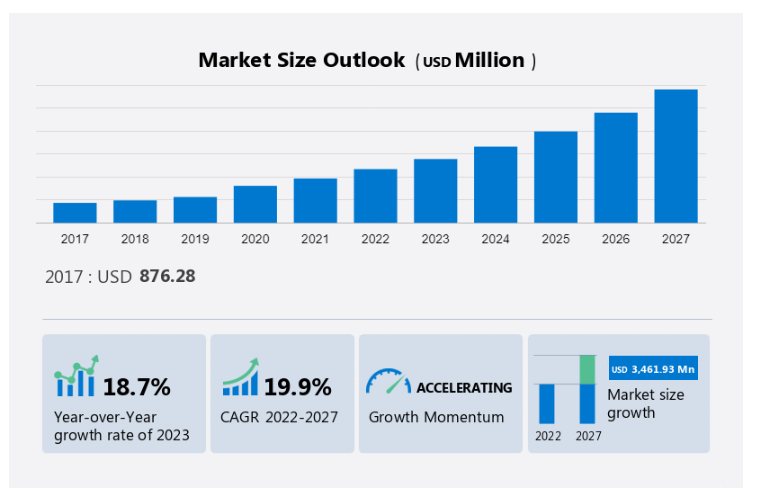
As the demand for interactive and engaging educational content intensifies, gamification stands out as a powerful strategy for Higher Education Marketers to captivate prospective students and cultivate a dynamic learning atmosphere.
In adapting to the evolving landscape, educational institutions are recognizing the impact of gamification not only in attracting students but also in revolutionizing the learning experience, making it more enjoyable, interactive, and conducive to academic success.
Mobile-First Approach
A Mobile-First Approach has emerged as a definitive strategy, substantiated by recent industry data. According to a report by Statista, the global number of mobile users is expected to reach 7.1 billion by 2023, emphasizing the pervasive influence of mobile devices.

In response to this paradigm shift, educational institutions are strategically prioritizing mobile-friendly platforms. The Educause Center for Analysis and Research highlights that 81% of students use mobile devices for academic purposes. This underscores the imperative for higher education marketers to optimize websites, apps, and content for seamless mobile experiences.
The significance of a Mobile-First Approach extends beyond accessibility; it aligns with the evolving preferences of the modern learner. A study by Nielsen reports that adults spend an average of 3 hours and 45 minutes per day on mobile devices.
This presents a substantial opportunity for education marketers to engage with prospective students through targeted, mobile-centric strategies.
As higher education institutions harness the potential of mobile technology, a Mobile-First Approach not only ensures accessibility but also positions educational offerings in sync with the digital habits of the contemporary learner, reinforcing the role of adaptability and innovation in effective education marketing.
Ethical Marketing
Ethical Marketing has emerged as a cornerstone, underpinned by a commitment to transparency and data privacy. Recent industry reports emphasize the paramount importance of ethical considerations in engaging prospective students.
![Higher Education Marketing 2023 and Beyond [Detailed Analysis], Higher Education Marketing, Education Marketing, Education PR, Digital PR, Public Relations, Digital Marketing, social media, SEO for Higher Education, Digital Marketing for Higher Education](https://firdoshkhan.in/wp-content/uploads/2022/11/Higher-Education-Marketing-Strategies.jpg)
According to a survey by the Pew Research Center, 79% of adults in the United States are concerned about how companies use their data. This heightened awareness underscores the need for educational institutions to adopt ethical marketing practices, assuring students that their data is handled responsibly.
Beyond data privacy, a focus on accurate information is integral to ethical marketing. Misleading practices can erode trust. A study by the Better Business Bureau found that deceptive advertising contributes significantly to consumer distrust. In the education sector, providing accurate, reliable information about programs, outcomes, and costs is crucial for building and maintaining trust.
In navigating the complex landscape of higher education marketing, institutions that prioritize transparency, data privacy, and accurate information cultivate a reputation for ethical marketing.
This not only aligns with societal expectations but also fosters trust among students, a foundational element for sustainable success in the competitive field of education marketing.
To Conclude
The evolving nature of education marketing demands continuous adaptation. Education marketers are urged to embrace these innovative strategies, recognizing their potential to not only meet but exceed the expectations of the dynamic student demographic.
Recent reports from the National Center for Education Statistics highlight the increasing demand for skill-based education. As students prioritize job-relevant skills, the Skill-Based Focus emerges as a key marketing strategy. Additionally, the rise of Micro-Credentials, evident in a 2023 report by HolonIQ, reflects a shift towards bite-sized learning for personalized career paths.
As we step into 2024, the future of education marketing is both promising and challenging, requiring a commitment to staying at the forefront of these transformative ideas.
The post 15 Big Ideas That Will Shape Education Marketing in 2024? appeared first on Firdosh Khan.
Navigating the Future: Higher Education Marketing Trends 2024 3 Dec 2023, 2:19 pm
Higher education marketing stands at the intersection of tradition and innovation, continually adapting to the dynamic landscape of student recruitment.

Higher education marketing stands at the intersection of tradition and innovation, continually adapting to the dynamic landscape of student recruitment.
As we approach 2024, institutions are compelled to reassess their strategies, harnessing the power of digital advancements and emerging trends to resonate with the ever-evolving preferences of prospective students.
In this era of unprecedented connectivity, the importance of staying ahead of marketing trends cannot be overstated. Latest reports from the Education Marketing Industry offer profound insights into the pivotal shifts awaiting higher education institutions. With a projected global higher education market value of USD 44,951.96 million by 2028, the stakes are high, urging institutions to not only survive but thrive in this competitive landscape.
As we dig into the trends shaping higher education marketing in 2024, the data speaks volumes. Digital marketing, constituting an average of 12% of total budgets, is a dominant force. The allocation is strategic, with 98% prioritizing websites, 95% leveraging email marketing, and 92% engaging in social media marketing. These channels, backed by the latest statistics, underscore the essentiality of a robust digital presence.
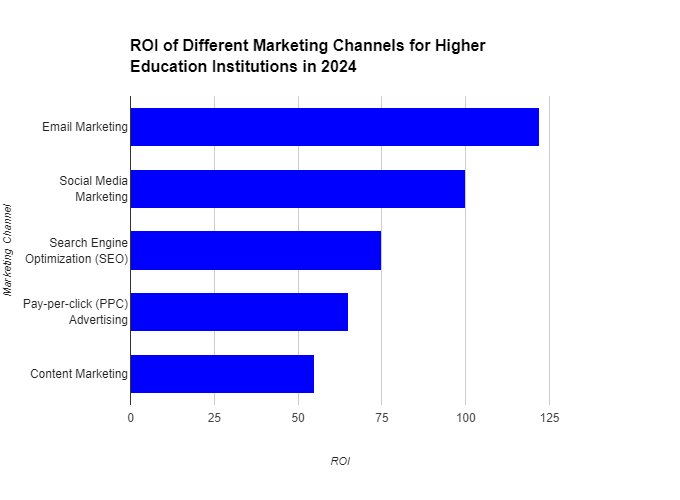
Video marketing emerges as a focal point, with a projected 15% growth in 2024. It’s not just a tool but a necessity, influencing 72% of prospective students in their application decisions. The global international student market, expected to reach USD 21.3 billion by 2028, necessitates a shift towards multilingual marketing and targeted outreach.
In this intricate dance of data and strategy, institutions must equip themselves with a nuanced understanding of the trends that will define 2024. This exploration seeks to unveil these trends, guiding institutions toward a future where innovation and adaptability are the cornerstones of successful higher education marketing.
Digital Dominance: The Core of Higher Education Marketing
In the fast-evolving landscape of higher education marketing, digital channels stand tall as the bedrock of institutions’ outreach strategies. The pivotal role of digital marketing is underscored by the commitment of higher education institutions to invest an average of 12% of their total budgets in digital initiatives in 2024.

These figures, gleaned from the latest reports in the Education Marketing Industry, affirm the imperative for institutions to harness the full spectrum of digital tools for effective student engagement. Digital marketing spending in 2024 is not just a mere allocation; it’s a strategic deployment of resources aimed at maximizing impact.
The breakdown of the digital marketing budget allocation reveals a nuanced approach, with 98% of institutions prioritizing their websites, 95% leveraging email marketing, and 92% actively engaging in social media marketing. These statistics underscore the undeniable importance of a strong online presence, recognizing websites, email, and social media as linchpins in the digital marketing arsenal.
In the realm of essential digital strategies, Search Engine Optimization (SEO) emerges as a cornerstone for higher education institutions. SEO is not merely a technical optimization exercise but a strategic imperative to enhance online visibility.
Institutions in 2024 are meticulously crafting their online content, ensuring that websites are optimized for relevant keywords and search terms. This proactive SEO approach aligns with the modern digital landscape, where prospective students rely on search engines to explore and discover higher education options.
Social Media Marketing (SMM) continues to be a driving force in the digital marketing landscape. With 80% of higher education institutions actively using social media, it has become an indispensable tool for connecting with prospective students.
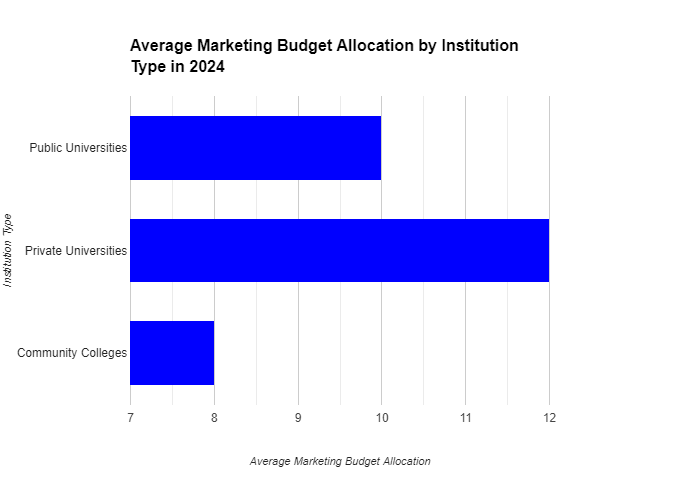
The power of platforms like Instagram (78%), YouTube (67%), and Facebook (62%) is harnessed to share news, events, and student stories. Social media has transcended its role as a mere communication channel; it has become a dynamic space for institutions to build their brand and engage with the student community.
Email Marketing, often hailed as a stalwart in the digital marketing arsenal, maintains its effectiveness with an average Return on Investment (ROI) of 122%. In 2024, institutions are leveraging personalized email campaigns to connect with prospective students.
The segmentation of email lists ensures tailored communication, delivering the right messages to the right audience. This personalized approach not only fosters engagement but also contributes significantly to the overall success of email marketing campaigns.
Mobile Marketing emerges as a strategic imperative, reflecting the shift in how prospective students access information. With mobile devices becoming the primary medium for accessing information about colleges and universities, institutions are adapting their strategies.
SMS messaging and push notifications are employed to reach prospective students effectively. The optimization of websites and marketing materials for mobile devices is non-negotiable in an era where accessibility and responsiveness define user experience.
Emerging Technologies, particularly Artificial Intelligence (AI) and Machine Learning (ML), are not just buzzwords but integral components of higher education marketing in 2024. Institutions are deploying AI-driven chatbots to answer student queries and provide support.
Personalized marketing recommendations, predictive analytics for identifying prospective students likely to apply, and automated email marketing campaigns underscore the transformative potential of AI and ML in the higher education marketing landscape.
The Power of Visuals: Video Marketing Takes Center Stage
Latest reports from the Education Marketing Industry forecast a remarkable 15% growth in video marketing in 2024. This surge is not just a quantitative uptick but a testament to the qualitative impact that videos wield in influencing the choices of prospective students.

A staggering 72% of these students affirm that video content played a decisive role in their application decisions, signaling a paradigm shift in how institutions convey their unique value propositions.
The significance of video marketing lies in its unparalleled ability to provide an immersive experience. Institutions are strategically leveraging videos to showcase their campuses and facilities, offering a virtual tour that transcends traditional brochures. This visual storytelling extends beyond the physical infrastructure; it captures the essence of academic life, fostering a connection with prospective students.
Student testimonials, another powerful application of video content, serve as authentic voices that resonate with the target audience. When 68% of prospective students cite testimonials as influential in their decision-making process, it underscores the trust-building potential inherent in hearing the experiences of peers.
The human element conveyed through video testimonials creates a relatable narrative, establishing an emotional connection that goes beyond the institutional pitch.
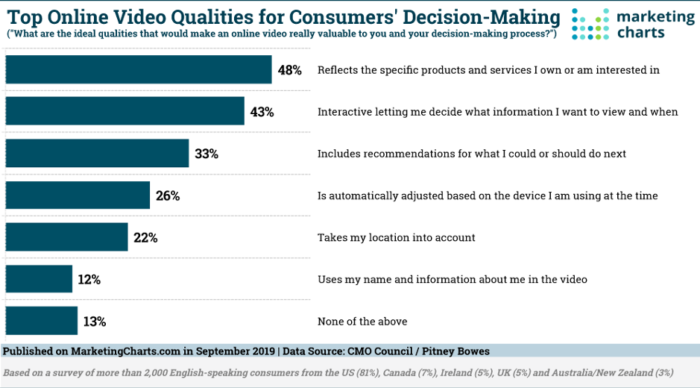
Academic program explanations through video content cater to the evolving preferences of modern learners. The visual medium allows institutions to breathe life into abstract program descriptions, offering a tangible glimpse into the learning experience.
Potential students are not just presented with facts; they are invited into a visual narrative that elucidates the dynamic nature of academic pursuits.
Immersive storytelling about the institution’s community is a nuanced application of video marketing. Beyond facilities and programs, institutions are using videos to convey the vibrant community that defines their identity. Whether it’s capturing cultural events, collaborative initiatives, or faculty-student interactions, this storytelling transcends the conventional, painting a holistic picture of the institution’s ethos.
The strategic integration of video marketing into higher education outreach is not a mere trend; it’s a responsive strategy to the evolving preferences of the target audience. It aligns with the modern student’s inclination towards visual content as a primary source of information.
As the data suggests, 90% of institutions in 2024 are recognizing the potential of video marketing and are poised to harness its transformative power.
Personalization Matters: Tailoring Messages to Individual Students
In crafting effective higher education marketing strategies for 2024, personalization emerges as a key determinant of success.
![Higher Education Marketing 2023 and Beyond [Detailed Analysis], Higher Education Marketing, Education Marketing, Education PR, Digital PR, Public Relations, Digital Marketing, social media, SEO for Higher Education, Digital Marketing for Higher Education](https://firdoshkhan.in/wp-content/uploads/2022/11/Online-Program-Higher-Education-Markrting-.jpg)
The landscape is evolving, and institutions are increasingly recognizing the imperative of tailoring messages to individual students. This commitment to personalization is not merely a trend; it’s a strategic response to the preferences of modern students and a data-driven approach to marketing.
The emphasis on personalization stems from a profound understanding that one size does not fit all in the diverse landscape of higher education. Institutions, armed with data-driven insights, are leveraging this knowledge to refine their marketing messages and create a more engaging and relevant experience for prospective students.
The data-driven approach is not just a buzzword; it’s a methodology that transforms raw information into actionable strategies, ensuring that each communication resonates with its intended audience.
Data, in this context, serves as the compass guiding institutions towards personalized marketing excellence. By leveraging student data, institutions can tailor their messages to align with individual preferences, academic interests, and aspirations. This extends beyond generic communications, leading to the creation of personalized emails, targeted ads, and relevant program recommendations.
Personalized emails, backed by a wealth of student data, represent a cornerstone of modern higher education marketing. The utilization of data ensures that each email is crafted with precision, delivering content that speaks directly to the recipient’s interests and needs.

The impact is palpable, with an average return on investment (ROI) of 122%, showcasing the effectiveness of a targeted and personalized email strategy.
Ads, in the age of personalization, transcend the generic and become strategic tools for engagement. Institutions are utilizing data to understand the online behaviors and preferences of prospective students, tailoring their ad campaigns to align with these insights.
This precision not only enhances the effectiveness of advertising efforts but also ensures that the institution remains at the forefront of the student’s decision-making journey.
Program recommendations, another dimension of personalized marketing, leverage data to guide prospective students towards academic offerings that align with their interests and career goals. This proactive approach is not just about promoting programs; it’s about facilitating a seamless and personalized exploration of academic pathways.
Successful personalized marketing campaigns are not just theoretical; they are exemplified through real-world case studies. Institutions across the globe are achieving remarkable results by harnessing the power of personalization.
Whether it’s a university sending targeted emails to prospective students based on their academic interests or a college tailoring its social media ads to resonate with the preferences of its audience, these examples underscore the transformative impact of personalized marketing.
Beyond Borders: International Student Recruitment
Recognizing the growing importance of global diversity and cross-cultural enrichment, international student recruitment has become a pivotal focus for higher education institutions.

In 2024, the imperative to extend beyond borders is not just a strategic choice; it is a necessity for institutions seeking to foster a globally inclusive and dynamic academic community.
The emphasis on recruiting international students is substantiated by compelling statistics from the Education Marketing Industry. The global higher education market, projected to reach USD 44,951.96 million by 2028, underscores the vast opportunities that international student recruitment presents for institutions.
Beyond the financial implications, institutions are increasingly recognizing the enriching impact of a diverse student body on campus culture and the overall academic experience.
Strategies for international student marketing extend beyond traditional outreach approaches. Multilingual marketing materials have become a cornerstone in this endeavor. Recognizing that language is a bridge to understanding, institutions are investing in materials that transcend linguistic barriers.
Brochures, websites, and promotional content are crafted in multiple languages, ensuring that prospective international students receive information in a language they are comfortable with.
Building relationships with international schools and organizations is another vital strategy in the toolkit of institutions. Recognizing the influence that these entities wield in guiding students towards higher education opportunities, institutions are establishing partnerships and collaborations.

This collaborative approach not only amplifies the institution’s reach but also fosters a network that supports prospective international students in their academic journey.
Statistics on the global international student market provide a comprehensive understanding of the landscape. With the global international student market expected to reach USD 21.3 billion by 2028, institutions are poised to tap into this vast reservoir of talent.
The top destinations for international students include the United States, the United Kingdom, Australia, Canada, and Germany. These statistics not only guide institutions in tailoring their marketing strategies but also highlight the competitive nature of international student recruitment.
In essence, international student recruitment in 2024 is not just about expanding the geographical reach of institutions; it’s about embracing a global perspective that enriches the entire academic community.
The strategies employed, from multilingual marketing materials to building collaborative relationships, reflect a nuanced understanding of the unique challenges and opportunities in international student recruitment. Beyond the financial considerations, the recruitment of international students contributes to the cultural vibrancy of institutions, fostering an environment where diverse perspectives thrive.
As institutions navigate the complexities of global competition for talent, the commitment to international student recruitment is not just a strategic move; it is a commitment to fostering a dynamic, inclusive, and globally connected academic ecosystem.
To Conclude
In the competitive landscape of higher education marketing in 2024, several key trends emerge as instrumental for institutional success. Digital dominance prevails, with institutions allocating 12% of their budgets to digital marketing channels, emphasizing the critical role of SEO, SMM, and email marketing.
Video marketing takes center stage, projected to grow by 15%, influencing 72% of prospective students in their application decisions. Personalization becomes paramount, with data-driven approaches facilitating tailored messages through emails, ads, and program recommendations, yielding an average ROI of 122%.
The global pursuit of talent is underscored by a projected USD 21.3 billion international student market by 2028, necessitating multilingual marketing materials and strategic partnerships.
Institutions must adapt to these trends for sustainable success. The call to action is clear: embrace innovation, leverage data, and foster a global mindset. Those who integrate these trends into their marketing strategies will not only thrive but also shape the future landscape of higher education.
Also Read:
The Impact of Internationalization on Higher Education Marketing?
How to Measure the Effectiveness of Your Higher Education Marketing Efforts
The Benefits of Collaborating with Other Higher Education Institutions for Marketing Purposes?
How to Stand Out in a Crowded Higher Education Market?
The post Navigating the Future: Higher Education Marketing Trends 2024 appeared first on Firdosh Khan.
Power of Social Media: Education Marketing Strategies for All Generations 19 Oct 2023, 2:44 am
Recent reports from the education marketing industry have provided compelling data showcasing the remarkable impact of social media in shaping the choices of prospective students.
![Higher Education Marketing 2023 and Beyond [Detailed Analysis], Higher Education Marketing, Education Marketing, Education PR, Digital PR, Public Relations, Digital Marketing, social media, SEO for Higher Education, Digital Marketing for Higher Education](https://firdoshkhan.in/wp-content/uploads/2022/11/Higher-ED-Marketing-Content.jpg)
In today’s dynamic educational landscape, staying ahead in the competitive market requires a strategic approach. Recent reports from the education marketing industry have provided compelling data showcasing the remarkable impact of social media in shaping the choices of prospective students.
According to a 2023 Kaplan study, a staggering 72% of students credit social media as a significant influence in their decision on where to pursue higher education. These figures are not to be underestimated, as they underscore the profound role that social media plays in guiding the academic journey of today’s learners.
In this digital era, an effective social media strategy is no longer a mere option; it is imperative for educational institutions seeking to remain relevant and influential. Our discussion will delve into the statistics that reveal how various generations engage with social media platforms.
Gen Z, the digital natives, lead the charge with 97% of users relying on social media to stay connected and 84% to explore new products. Millennials, Gen X, and Baby Boomers follow, each with their unique behaviors and preferences that shape the social media landscape.
Understanding Social Media Usage across Generations
Recent data from the education marketing industry paints a vivid picture of the digital era’s profound influence on education.
![Higher Education Marketing 2023 and Beyond [Detailed Analysis], Higher Education Marketing, Education Marketing, Education PR, Digital PR, Public Relations, Digital Marketing, social media, SEO for Higher Education, Digital Marketing for Higher Education](https://firdoshkhan.in/wp-content/uploads/2022/11/Higher-Education-Marketing-Strategies.jpg)
The numbers reveal that social media has become a ubiquitous force across all generations. In 2023, a Sprout Social study unveiled that 85% of Gen Z, 77% of Millennials, 67% of Gen X, and even 52% of Baby Boomers are daily patrons of social media platforms.
The preferences among these generations for specific social media platforms further accentuate the need for a nuanced approach. Gen Z, the first true digital natives, flock to Instagram and TikTok, where they not only connect with friends and family but also explore new products and brands.
Millennials find their digital homes on Facebook and Instagram, using these platforms for both personal and brand-related engagements. Meanwhile, Gen Xers favor the professional networks of Facebook and LinkedIn, as do Baby Boomers, although to a slightly lesser extent.
The significance of these statistics is crystal clear: to effectively market educational institutions to different generations, we must be present where they are and adapt our content and strategies to align with their preferred social media platforms.
This underlines the dynamic nature of our field and the necessity for a comprehensive understanding of each generation’s digital behavior. In the following sections, we’ll explore how to harness this knowledge to achieve success in promoting your education business to these diverse demographics.
Leveraging Social Media for Education Business Promotion
In today’s digital age, understanding the unique social media behaviors of each generation is paramount to crafting a successful marketing strategy. Recent data from the education marketing industry paints a vivid picture of the digital era’s profound influence on education.

The numbers reveal that social media has become a ubiquitous force across all generations. In 2023, a Sprout Social study unveiled that 85% of Gen Z, 77% of Millennials, 67% of Gen X, and even 52% of Baby Boomers are daily patrons of social media platforms.
The preferences among these generations for specific social media platforms further accentuate the need for a nuanced approach. Gen Z, the first true digital natives, flock to Instagram and YouTube Shorts, where they not only connect with friends and family but also explore new products and brands.
Millennials find their digital homes on Facebook and Instagram, using these platforms for both personal and brand-related engagements. Meanwhile, Gen Xers favor the professional networks of Facebook and LinkedIn, as do Baby Boomers, although to a slightly lesser extent.
The significance of these statistics is crystal clear: to effectively market educational institutions to different generations, we must be present where they are and adapt our content and strategies to align with their preferred social media platforms.
This underlines the dynamic nature of our field and the necessity for a comprehensive understanding of each generation’s digital behavior. In the following sections, we’ll explore how to harness this knowledge to achieve success in promoting your education business to these diverse demographics.
Tailoring Your Approach to Each Generation
In the realm of education marketing, a one-size-fits-all approach is quickly becoming obsolete. To truly harness the potential of social media in promoting educational businesses to different generations, a tailored strategy is key.

The data reveals a fascinating tapestry of generational differences in social media usage. Gen Z, the digitally native cohort, thrives on connectivity and learning.
They are eager for educational, informative, and entertaining content. They also have a penchant for product discovery through social media. Millennials, on the other hand, prioritize personal connections and the pursuit of knowledge.
They’re most active on Facebook and Instagram, trusting the recommendations of friends and family. Gen X is discerning, seeking authenticity and trustworthy content. Baby Boomers, though less active, still value social media as a means to stay connected and informed.
To navigate this diverse landscape successfully, educational institutions must adapt their content and strategies. For Gen Z, educational and entertaining content is the way forward. Millennials appreciate content that is personally relevant and authentic.
Gen X seeks trustworthiness and sincerity, while Baby Boomers prefer informative and helpful posts. The use of hashtags, social media advertising, and active interaction is crucial for engaging all generations.
By recognizing these unique generational characteristics and tailoring our approach accordingly, educational institutions can effectively reach and engage with prospective students from all walks of life. In our final section, we will delve further into the intricacies of using social media marketing to its full potential in the education sector.
Advanced Social Media Strategies for Educational Institutions
In the ever-evolving landscape of education marketing, staying at the forefront of innovation is paramount. Social media, as our data suggests, is not merely a tool for promotion but a versatile platform for educational institutions to deliver content and create ground-breaking learning experiences.

One of the emerging trends in the education sector is the use of social media for the delivery of educational content. Recent reports, such as the 2023 HolonIQ study, predict that the global online education market will reach $1 trillion by 2030.
Social media is taking center stage in this shift, offering a convenient and accessible channel to impart knowledge to students across the world. Virtual classrooms, interactive learning modules, and real-time simulations are becoming part of this new wave, redefining how students engage with educational material.
Moreover, social media is proving instrumental in the promotion of diversity and inclusion in education. Institutions are creating online communities for underrepresented groups, enabling them to connect and share their experiences.
It’s also serving as a powerful tool for raising awareness of issues like racial injustice and gender inequality, driving social justice initiatives.
Another aspect where social media is making a significant impact is in supporting students with disabilities. Educational institutions are leveraging these platforms to provide students with disabilities access to resources and support services. This is fostering a more inclusive and supportive learning environment.
By embracing advanced social media strategies, educational institutions can not only reach prospective students effectively but also lead the way in shaping the future of education.
These strategies not only promote their offerings but also showcase their commitment to diversity, inclusion, and innovation. In the next section, we’ll conclude our exploration of using social media marketing for education businesses, summarizing its critical role in an ever-evolving sector.
Best Practices for Inclusive and Accessible Social Media Marketing
One of the emerging trends in the education sector is the use of social media for delivering educational content. Recent reports, such as the 2023 HolonIQ study, predict that the global online education market will reach $1 trillion by 2030.

Social media is taking center stage in this shift, offering a convenient and accessible channel to impart knowledge to students across the world. Virtual classrooms, interactive learning modules, and real-time simulations are becoming part of this new wave, redefining how students engage with educational material.
Moreover, social media is proving instrumental in promoting diversity and inclusion in education. Institutions are creating online communities for underrepresented groups, enabling them to connect and share their experiences. It’s also serving as a powerful tool for raising awareness of issues like racial injustice and gender inequality, driving social justice initiatives.
Another aspect where social media is making a significant impact is in supporting students with disabilities. Educational institutions are leveraging these platforms to provide students with disabilities access to resources and support services. This is fostering a more inclusive and supportive learning environment.
Conclusion
In an era where education and marketing are increasingly intertwined, leveraging the power of social media to promote your education business to diverse generations is not just advantageous; it’s a necessity. Our examination of the latest industry reports and data clearly underscores this.
Educational institutions must embrace the power of social media marketing, catering to diverse generations and embracing innovative practices. This dynamic platform isn’t just about reaching prospective students; it’s about shaping the future of education.
Promoting diversity and inclusion in education and championing social justice initiatives are additional benefits that social media offers. These strategies are instrumental in creating an inclusive and accessible learning environment.
As the landscape continues to evolve, staying updated is paramount to success in education marketing. The key takeaway? Social media is not just a trend; it’s an educational revolution.
The post Power of Social Media: Education Marketing Strategies for All Generations appeared first on Firdosh Khan.
How Micro-Influencers Supercharge Your Education Marketing? 9 Oct 2023, 11:47 pm
Micro-influencers, individuals with a modest yet highly engaged online following, have emerged as powerful conduits for promoting education businesses.

In today’s dynamic landscape of education marketing, staying ahead of the curve is crucial for institutions and businesses alike.
As the digital realm continues to evolve, so do the strategies employed to reach prospective students and learners. One such strategy that has gained remarkable traction is the utilization of micro-influencers.
Micro-influencers, individuals with a modest yet highly engaged online following, have emerged as powerful conduits for promoting education businesses.
In the ever-expanding universe of social media, these influencers hold a unique advantage. They offer authenticity, relatability, and, most importantly, a heightened level of trust among their followers.
Consider this: A recent study by Sprout Social revealed that micro-influencers generate a staggering 22.2 times more engagement per post than their macro-influencer counterparts in the education sphere.
Furthermore, data from Nielsen illustrates that an astonishing 92% of consumers place their trust in recommendations from individuals they know or follow online, even if they have no personal acquaintance with them.
The Power of Micro-Influencers in Education Marketing
The influence of micro-influencers stems from their unique ability to connect with their audience on a personal level.

Recent data from Sprout Social underscores this point, revealing that micro-influencers generate a staggering 22.2 times more engagement per post than their macro-influencer counterparts in the education sector. This heightened engagement translates into a deeper, more meaningful connection with the target demographic.
Moreover, the trust factor plays a pivotal role in the effectiveness of micro-influencers within the realm of education marketing.
Nielsen’s research reveals that a remarkable 92% of consumers place their trust in recommendations from individuals they know or follow online, regardless of personal acquaintance. This high level of trust is particularly significant in education, where credibility and authenticity are paramount.
In an industry where authenticity and engagement are key, micro-influencers wield an influence that transcends mere numbers. Their power lies in their capacity to create authentic, relatable content that resonates deeply with prospective students and learners.
As we explore the dynamics of using micro-influencers to promote education businesses, it becomes evident that their influence is a force to be reckoned with, capable of driving engagement, fostering trust, and ultimately shaping the success of educational endeavors.
Cost-Effectiveness of Micro-Influencer Marketing
The average cost per post for a micro-influencer, ranging from $100 to $500, emerges as a fiscally responsible choice. In stark contrast, macro-influencers command fees that can soar to $5,000 to $10,000 per post.

This substantial disparity emphasizes the budget-friendly nature of micro-influencer campaigns. At a time when judicious resource allocation is paramount, education businesses can capitalize on this budget-friendly approach.
Micro-influencer marketing aligns well with fiscal realities while delivering amplified engagement and trust-building benefits.
Understanding the financial dynamics of micro-influencer marketing is pivotal. It reveals that, in comparison to their macro counterparts, micro-influencers offer an economically savvy solution.
By embracing the cost-effectiveness of micro-influencer campaigns, education marketers can achieve their goals while maintaining prudent financial stewardship, ensuring that every marketing dollar spent yields a substantial return on investment.
Implementing Micro-Influencer Marketing in Your Education Business
Incorporating micro-influencer marketing into your education business strategy is not just a trend; it’s a strategic imperative in today’s digital landscape. Let’s delve into the essential steps for a successful implementation.
![Higher Education Marketing 2023 and Beyond [Detailed Analysis], Higher Education Marketing, Education Marketing, Education PR, Digital PR, Public Relations, Digital Marketing, social media, SEO for Higher Education, Digital Marketing for Higher Education](https://firdoshkhan.in/wp-content/uploads/2022/11/Higher-Education-Marketing-Strategies-Post.jpg)
Begin by identifying micro-influencers who align with your education niche. The process involves meticulous research to pinpoint individuals whose content resonates with your target audience. Data-driven insights are crucial here, ensuring that you engage with influencers whose followers mirror your potential students.
Building strong relationships with selected micro-influencers is paramount. Taking the time to connect, understand their values, and share your educational mission fosters mutual trust. Authenticity in these relationships is key, ensuring that influencers genuinely align with your brand.
Setting clear goals and expectations is the next crucial step. Outline what you aim to achieve through collaborations—be it increased enrollment, improved brand awareness, or enhanced engagement. Transparency ensures that both parties are on the same page regarding objectives and outcomes.
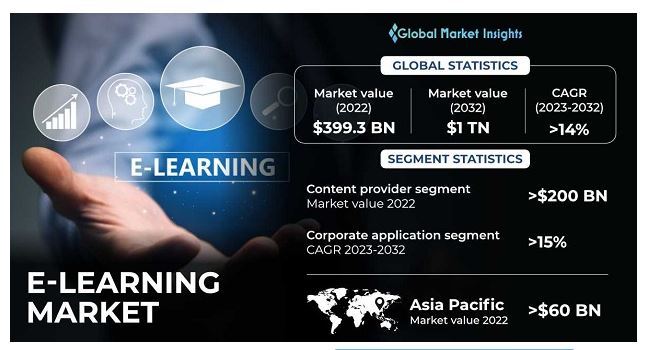
Encourage creative freedom among micro-influencers when it comes to content creation. These influencers thrive when allowed to produce authentic, relatable content that resonates with their followers. Their unique voice and style contribute to building trust and engagement within your target audience.
Hence, implementing micro-influencer marketing in your education business is about forging authentic connections, setting clear objectives, and giving influencers the creative freedom they need to authentically promote your brand.
When executed effectively, these steps can yield significant benefits for your education business in terms of visibility, credibility, and enrollment rates.
Measuring Success and Future Trends in Micro-Influencer Marketing for Education
Micro-influencer marketing, when executed effectively, can yield substantial returns. Here, we delve into the crucial aspect of measuring success and explore future trends in this dynamic space.

Tracking and measuring return on investment (ROI) with metrics is fundamental. Metrics such as engagement rates, website traffic, and leads generated provide valuable insights into the effectiveness of your micro-influencer campaigns.
Recent data from Influencer Marketing Hub suggests that the average ROI for micro-influencer marketing in education is an impressive 3.5x, underscoring its potential for significant returns.
Real-life examples of education businesses leveraging micro-influencers abound. Leading online learning platforms, test prep companies, and universities have harnessed the power of micro-influencers to reach, engage, and convert prospective students.
These success stories serve as compelling evidence of the impact that well-executed micro-influencer campaigns can have on education businesses.
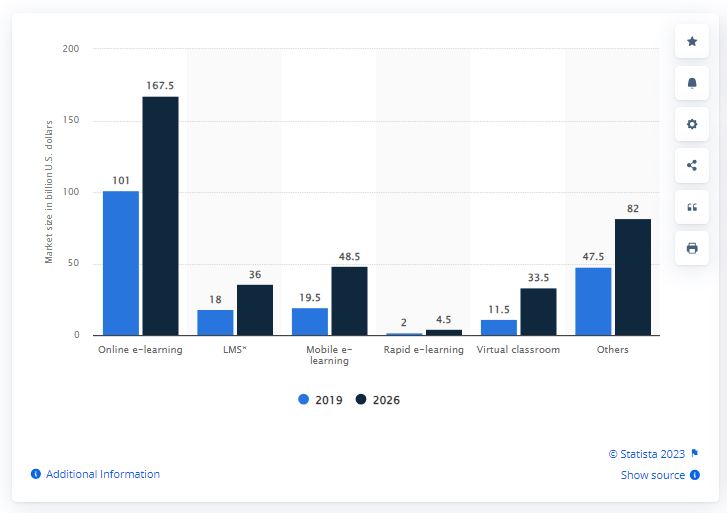
The trend of micro-influencer marketing in education is on a steady ascent. A recent study by Influencer Marketing Hub found that 76% of education businesses plan to increase their investment in micro-influencer marketing in 2023, indicating a growing recognition of its efficacy.
As we look ahead, future opportunities and strategies in this space are rife with potential. Emerging niches within education, such as STEM, business education, and language learning, present fertile ground for micro-influencer partnerships.
Moreover, as the digital landscape continues to evolve, embracing new platforms and technologies will be integral to staying ahead in the micro-influencer marketing game.
To Conclude
Education businesses stand at a crossroads of opportunity. The data and insights from this exploration underscore the transformative potential of micro-influencer marketing.
The message is clear: it’s time to harness this potential, embrace authenticity, and leverage the trust and engagement that micro-influencers offer to propel your education business into a brighter future.
In this journey through the world of micro-influencers, we’ve uncovered their power in driving engagement, building trust, and ultimately shaping the success of education businesses.
Moreover, the financial prudence they offer, with an average cost per post ranging from $100 to $500, as compared to the substantial fees commanded by macro-influencers, emphasizes their budget-friendly nature.
The post How Micro-Influencers Supercharge Your Education Marketing? appeared first on Firdosh Khan.
Page processed in 1.389 seconds.
Powered by SimplePie 1.3.1, Build 20121030175403. Run the SimplePie Compatibility Test. SimplePie is © 2004–2024, Ryan Parman and Geoffrey Sneddon, and licensed under the BSD License.
